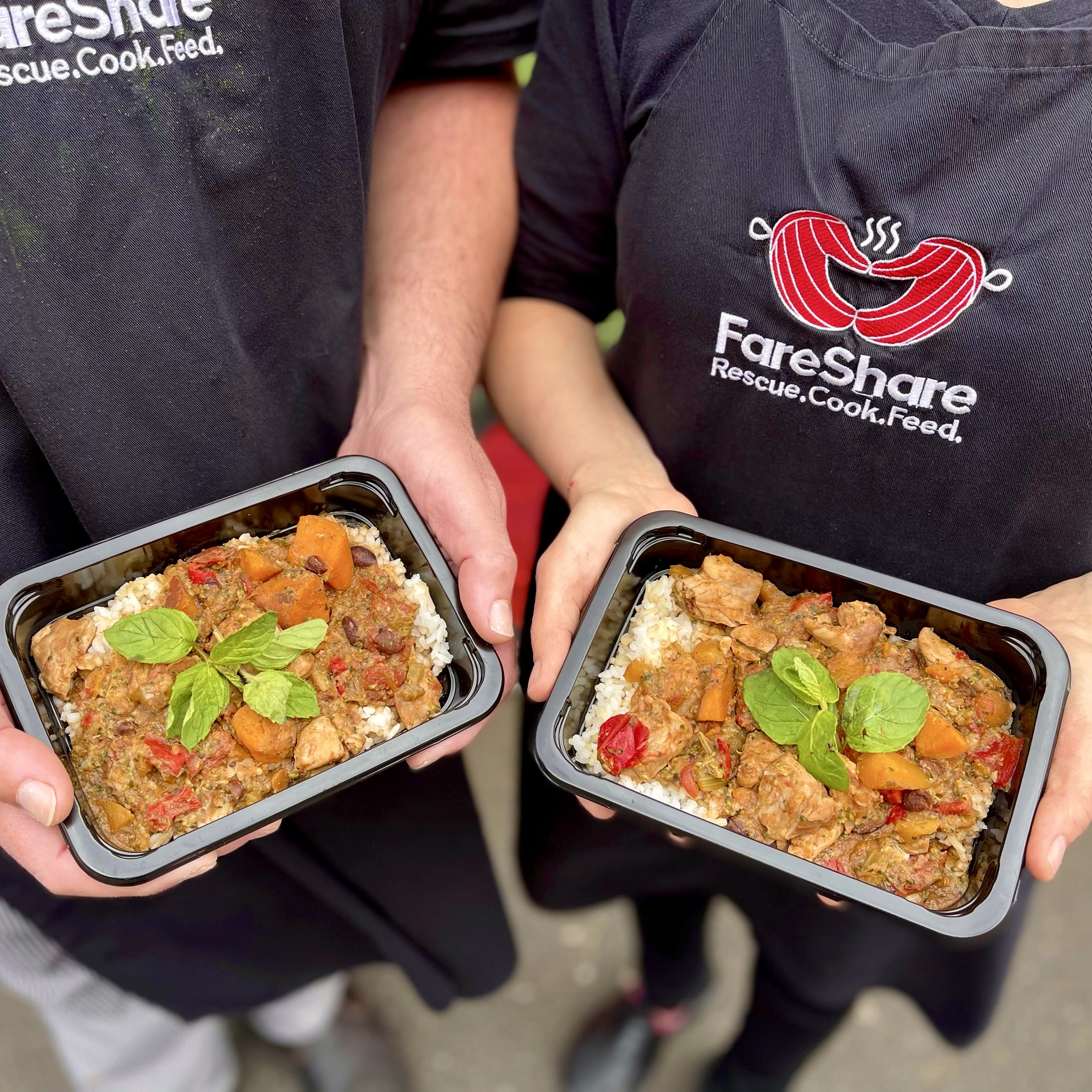FareShare Annual Report 2022
Cooking free, nutritious meals for people facing hardship for 20 years and counting...
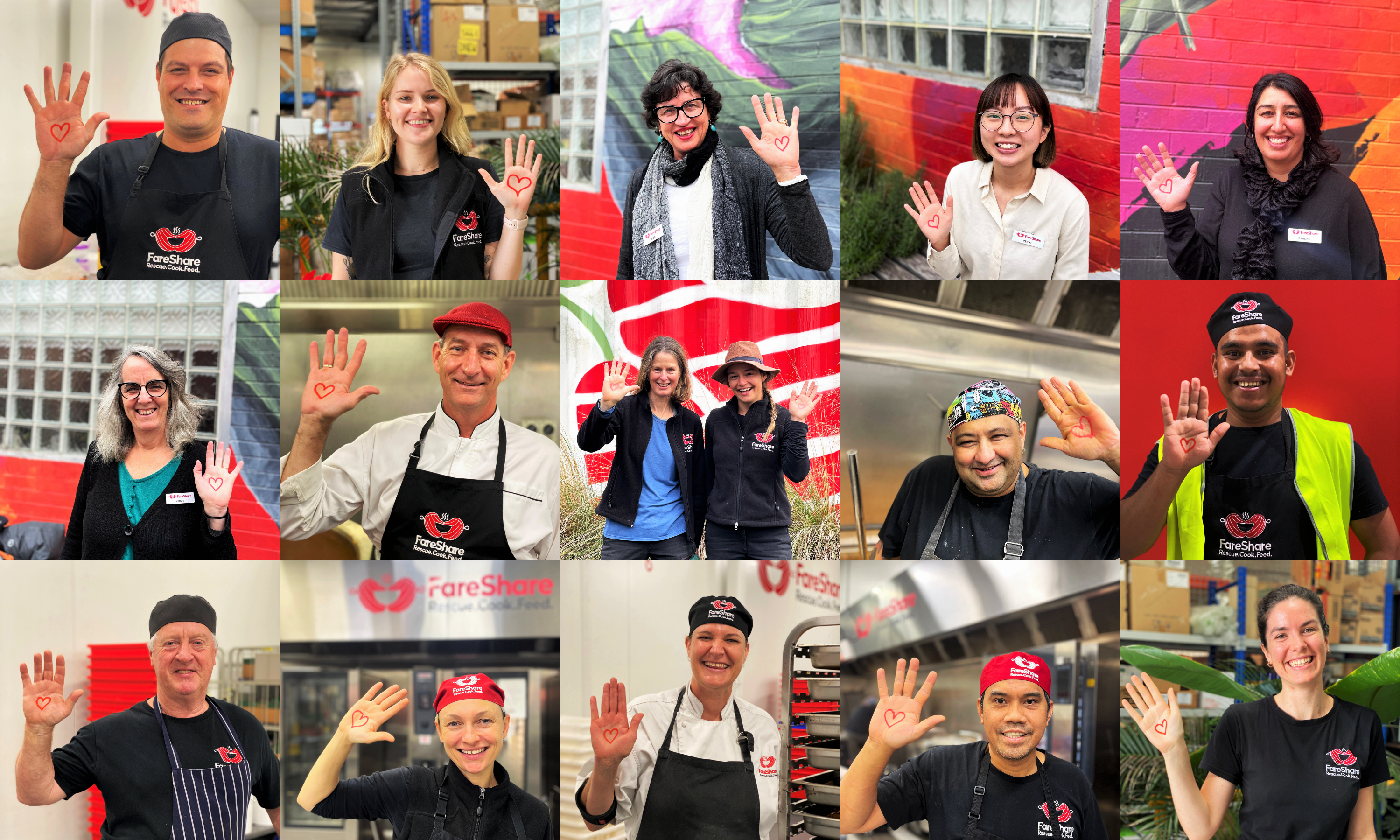
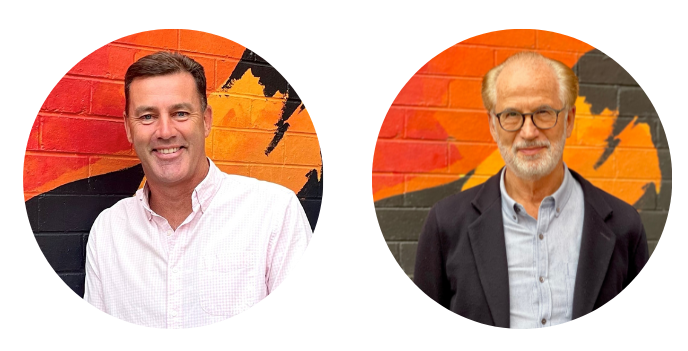
A message from our CEO Paul Conroy and President David Harris OAM
The last 12 months have been both exciting and challenging. We emerged from the initial disruption of the pandemic to return to our volunteer-powered model. However, living with COVID has meant we, like many other organisations in the charity sector, have struggled to return to full operational capacity and to cook the volume of meals we were cooking prior to the pandemic. With that said, it has been truly amazing to see volunteer numbers back to what they were pre-COVID, and it appears that the impact of the pandemic on FareShare is finally diminishing.
Maintaining steady meal production to meet demand over the last 12 months has presented a significant challenge. The two biggest influences on our ability to cook nutritious meals - the supply of ingredients and access to a volunteer workforce - have both been significantly disrupted. The severe floods have particularly impacted the consistent supply of vegetables to our kitchen in Queensland and reactivating our volunteer workforce has proven to be slow in all areas of the charity sector, particularly for our operations in Victoria which has been hardest hit by the lingering effects of COVID.
It has been truly amazing to see volunteer numbers back to what they were pre-COVID, and it appears that the impact of the pandemic on FareShare is finally diminishing.
However, impact for FareShare is not defined by the number of meals we cook. Our focus is to make every single meal count and to bring as much dignity and respect to food relief as possible to help Australians in times of hardship. This goal is seeing FareShare continually invest time, money and resources into the quality of our meals. While this means we spend greater time cooking and packing our meals, it also enables us to offer a broader choice of healthy and nutritious meals and to present them in contemporary, familiar and dignified formats. This is key to ensuring our meals provide emotional, as well as physical benefits, to every single person who eats them.
We continue to see an unprecedented level of food insecurity in the community with rising cost of living pressures, natural disasters and the pandemic hurting millions of Australians. These and other factors have created strong demand for free, healthy meals and increased the never-ending challenge to raise the necessary funds. We know that FareShare alone cannot meet this demand, and while we will cook as many meals as we can, we also appreciate the importance of collaborating with other charity kitchens. The last 12 months have seen us build strong relationships with like-minded cooking organisations and we will continue to dedicate time to share knowledge and ingredients to strengthen support for those in need.
In addition to cooking wonderful meals, dignified food relief also requires getting the right meals to the people most in need. Distributing the majority of our own meals in Victoria allows us to have a direct line of communication to understand the meal needs and preferences of frontline charities and their clients. We will continue to build closer ties with these charities together with our key distribution partners, such as SecondBite and Foodbank QLD, as we work together to match individual meals and formats to the diverse needs of our community. By optimising collaboration, food relief organisations can reduce their operating costs and deliver increased social dividends to their generous donors.
The last year also saw FareShare expand its specific meal programs with First Nations communities. Our commitment to support First Nations peoples, who suffer disproportionately high rates of food insecurity, was strengthened by the appointment of Jason Mollenhauer as First Nations Officer and the development of our Reflect Reconciliation Action Plan which was launched in Queensland and Victoria during NAIDOC Week. (Please refer to the Reconciliation section of this report for more details)
In addition, FareShare has grown its relationship with selected regional supermarkets and Linfox, which has now distributed over 100,000 meals to smaller regional and remote areas in need of food relief. By partnering with such community-minded organisations and accessing their supply chains, we can send much-needed meals to people who aren’t nearly as well supported as those experiencing hardship in large metropolitan areas.
FareShare has also taken strides to improve our environmental performance. Reducing food waste was a primary driver in FareShare’s creation and we continue to invest in ways to improve our sustainability performance from energy generation and storage, to packaging and pallet wrapping. (Please refer to the separate sustainability feature below)
Longstanding CEO Marcus Godinho stepped back from his management responsibilities to focus his efforts on further strengthening our existing relationships and developing new partnerships with supporters. On his recommendation, Paul Conroy was appointed CEO.
Whilst juggling the rapid and ongoing changes with recent evolutions of the pandemic, we have also been progressing our plans for our reimagined, enlarged Abbotsford facility that will help us to expand our ability to cook and distribute our new range of nutritious, appealing meals with greater impact. Our operational blueprint is well developed, and we hope to secure financial support in the coming months to allow us to commence the build in 2023.
We thank everyone who has generously contributed to our mission to improve the lives of people in hardship with free, nutritious meals this year.
We thank everyone who has generously contributed to our mission to improve the lives of people in hardship with free, nutritious meals this year. We also want to acknowledge the ongoing financial support from the Victorian government and extend a heartfelt thank you to our food donors, including Woolworths. Speaking of, we would like to take a moment to acknowledge Woolworths as much more than a food donor. We are indebted to their generous support at all levels.
Thanks again to Les Baguley and his family for their ongoing support – access to their land in southeast Melbourne allows our gardeners and volunteers to cultivate vegetables which provide critical nutrition and added taste to our meals.
We would like to extend a sincere thanks to Philip Brass AO, who recently stepped down from the FareShare board after over 12 years of wise counsel and support. We are very grateful for his invaluable contributions.
Finally, a big thank you to all the volunteers who have gone above and beyond in the toughest of times. FareShare could not exist without a community of people who share our passion and commitment to improve the lives of people doing it tough.
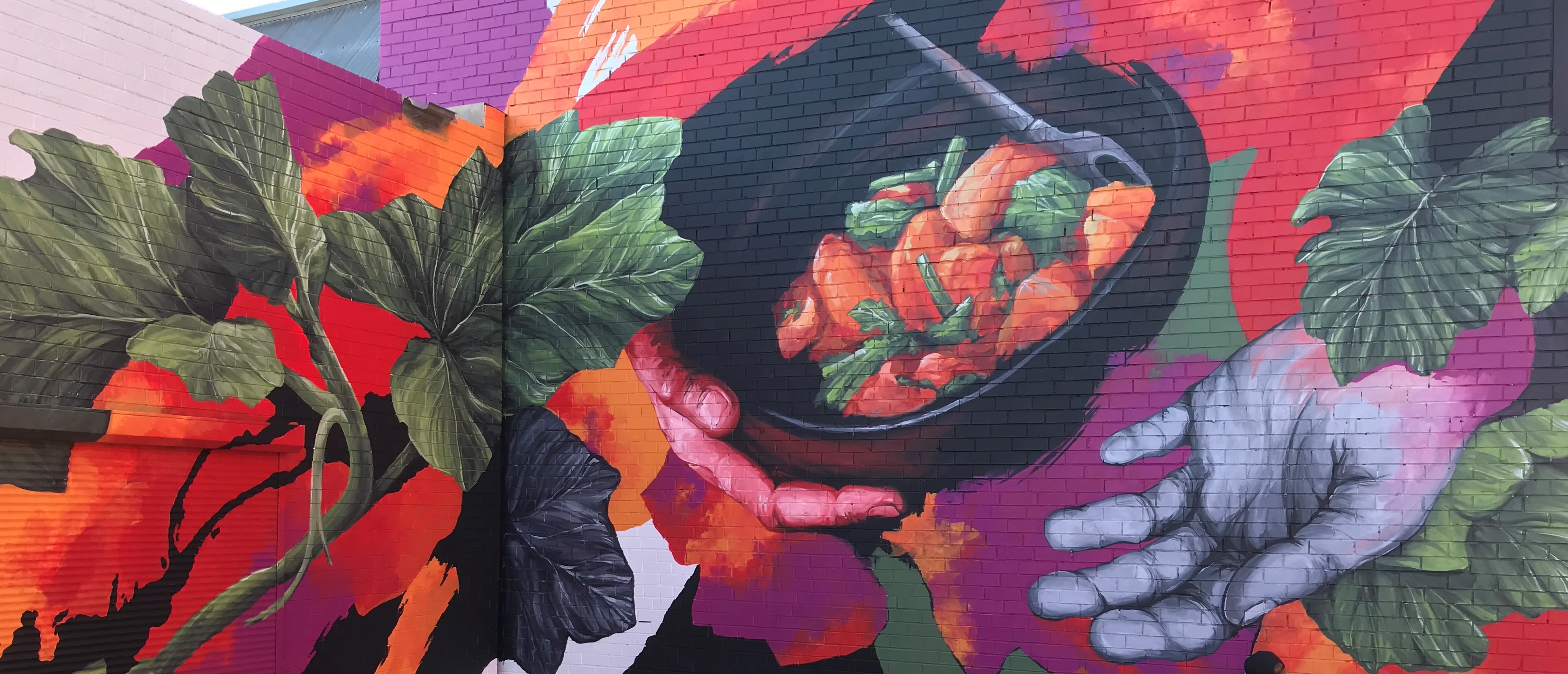
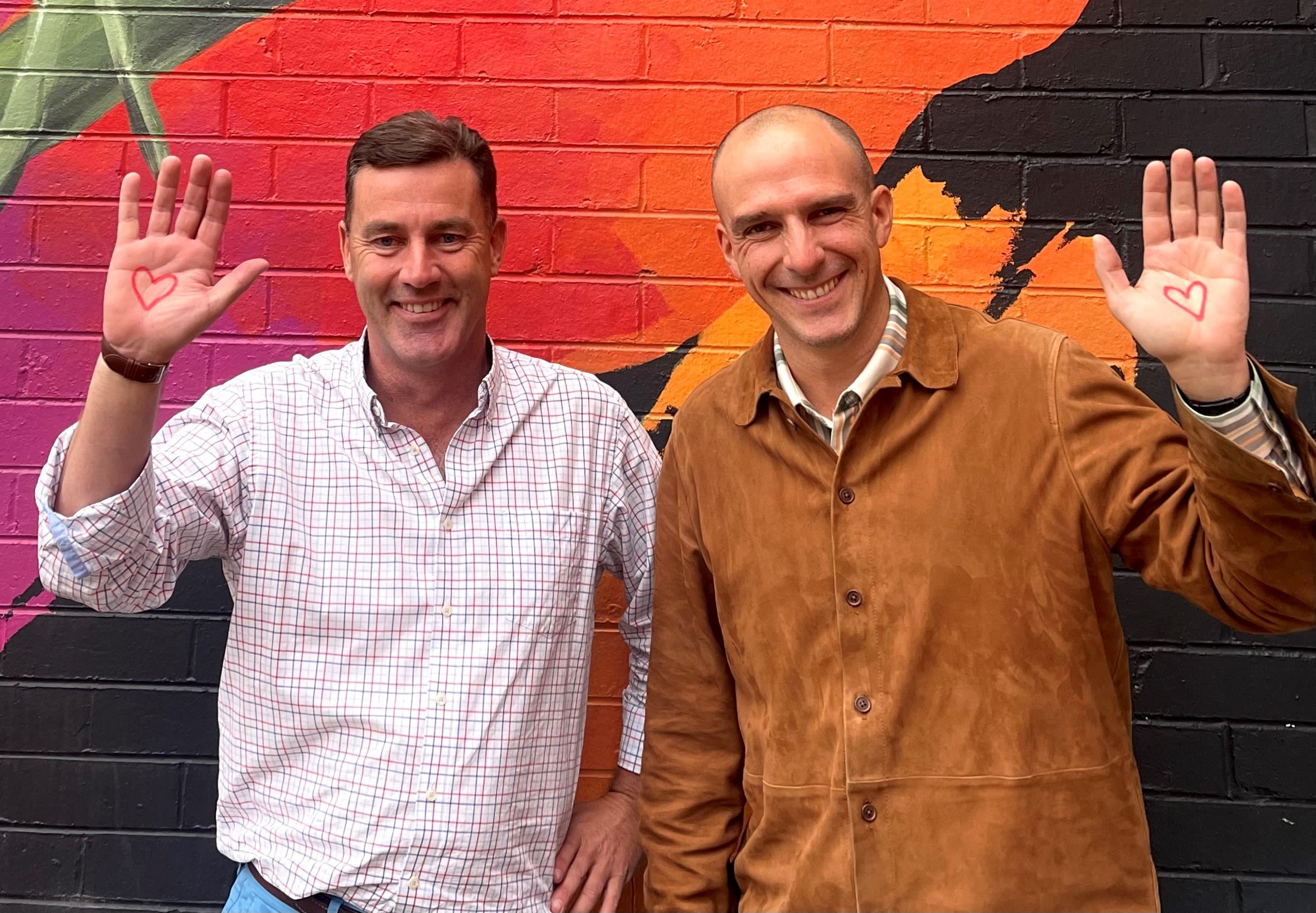
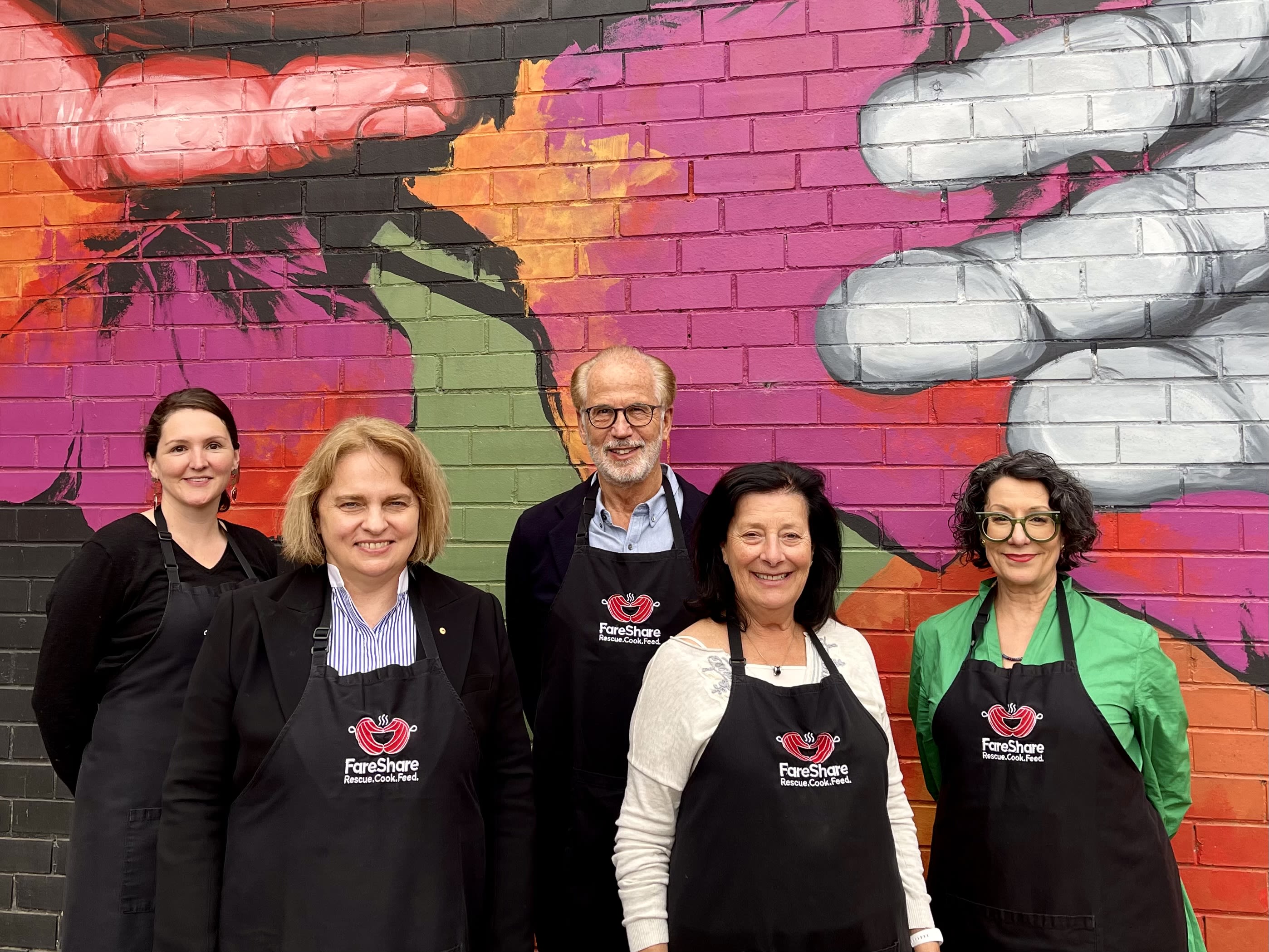
Speaking to our impact
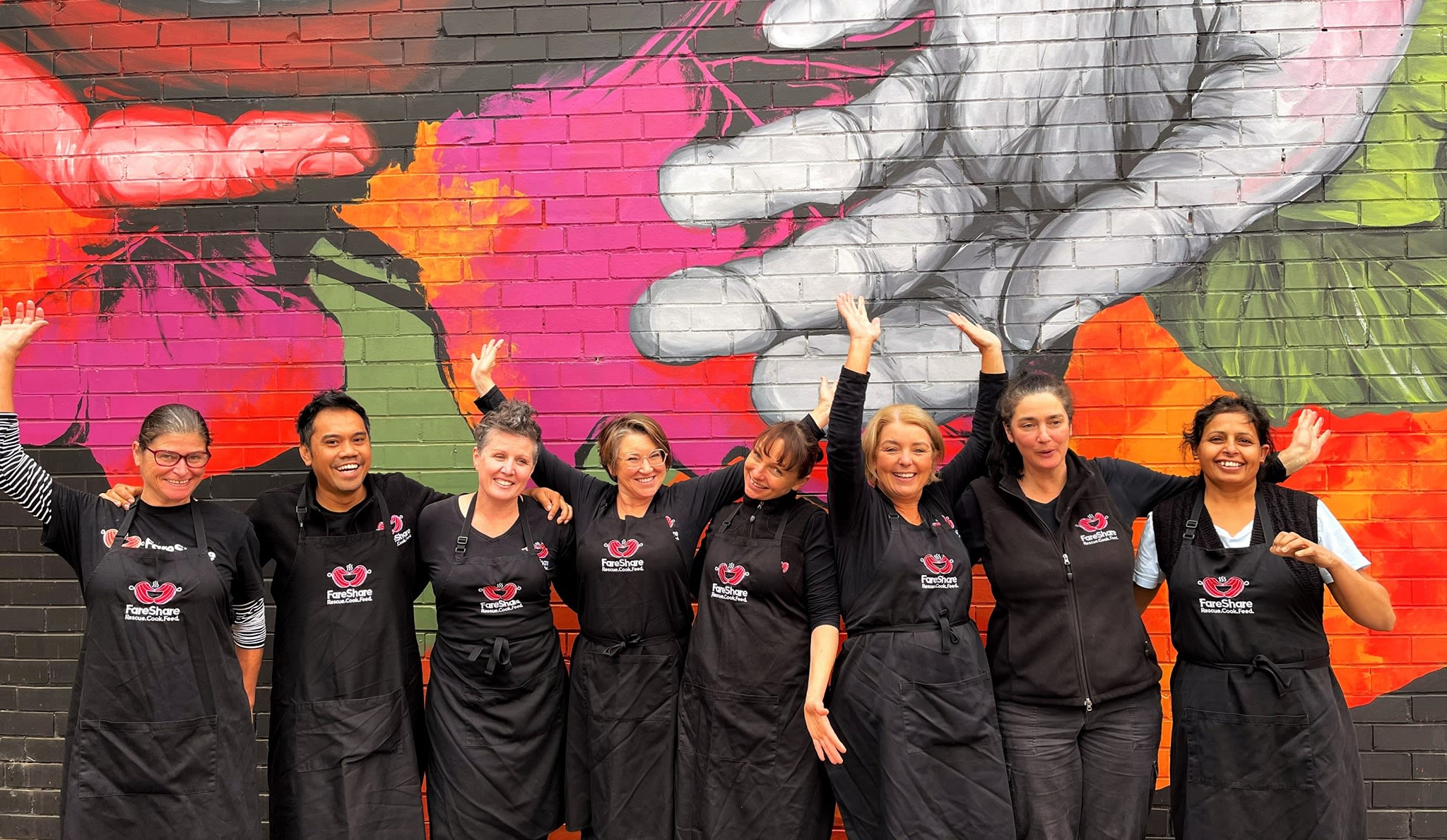
“Worrying about money and where your next meal is coming from can be mentally debilitating. Having a hot meal that is easy to prepare can assist with both a person’s mental and physical wellbeing through feeding the mind and body. Problems always become bigger on an empty stomach.”
- Annie Constable, Bendigo Foodshare
“We have some residents who are not strong enough to even open cans and packages but have no problem opening and heating the FareShare meals. This makes a world of difference when isolating with no external support.”
- Mitchell Wood, City of Yarra COVID Food and Emergency Relief
“Meals from FareShare come as a blessing as we deliver those meals – one family meal and two single meals to every house. Meals are very healthy with lots of vegetables.”
- Chatur Zala, CEO Cherbourg Aboriginal Shire Council, Queensland
“The meals give hope if you can’t access fresh produce or a kitchen to make your own. Having a glimpse of hope supports your mental health and outlook on life.”
- Rebecca Auriant, ADRA
“When our students have food in their stomachs we see that they are happier, concentration span improves for learning, social interaction is positive, more energy throughout the day.”
- Rebecca Bagshaw, Sale & District Specialist School
"Just a quick note to let you know that you are appreciated. My little place at Chinderah was badly flooded in the recent floods. I am now back living in the shell of my home and things are slowly improving - very much a day at a time thing. Tonight I had one of your roast chicken meals which was left in our community freezer. It was a real meal and was lovely. Thank you."
- Steve, Chinderah, NSW
“Many of our recipient households are refugees seeking asylum in Australia who have experienced trauma and isolation and they are very appreciative of the feeling of care and support provided by a nutritious cooked meal.”
- Nicole Brown, Coordinator, Project Dignity, Temple Beth Israel
“Our clients have a number of physical and mental health issues and having nutritious, healthy food makes a difference to their health.”
- Dean Rogut, cohealth Innerspace
“I have been given a lot of your meals to get me through. I have cancer and require lots of trips to Brisbane which on a pension leaves me broke. Thanks to you guys, I still get to eat and enjoy nice meals."
- Catherine, meal recipient, Queensland.
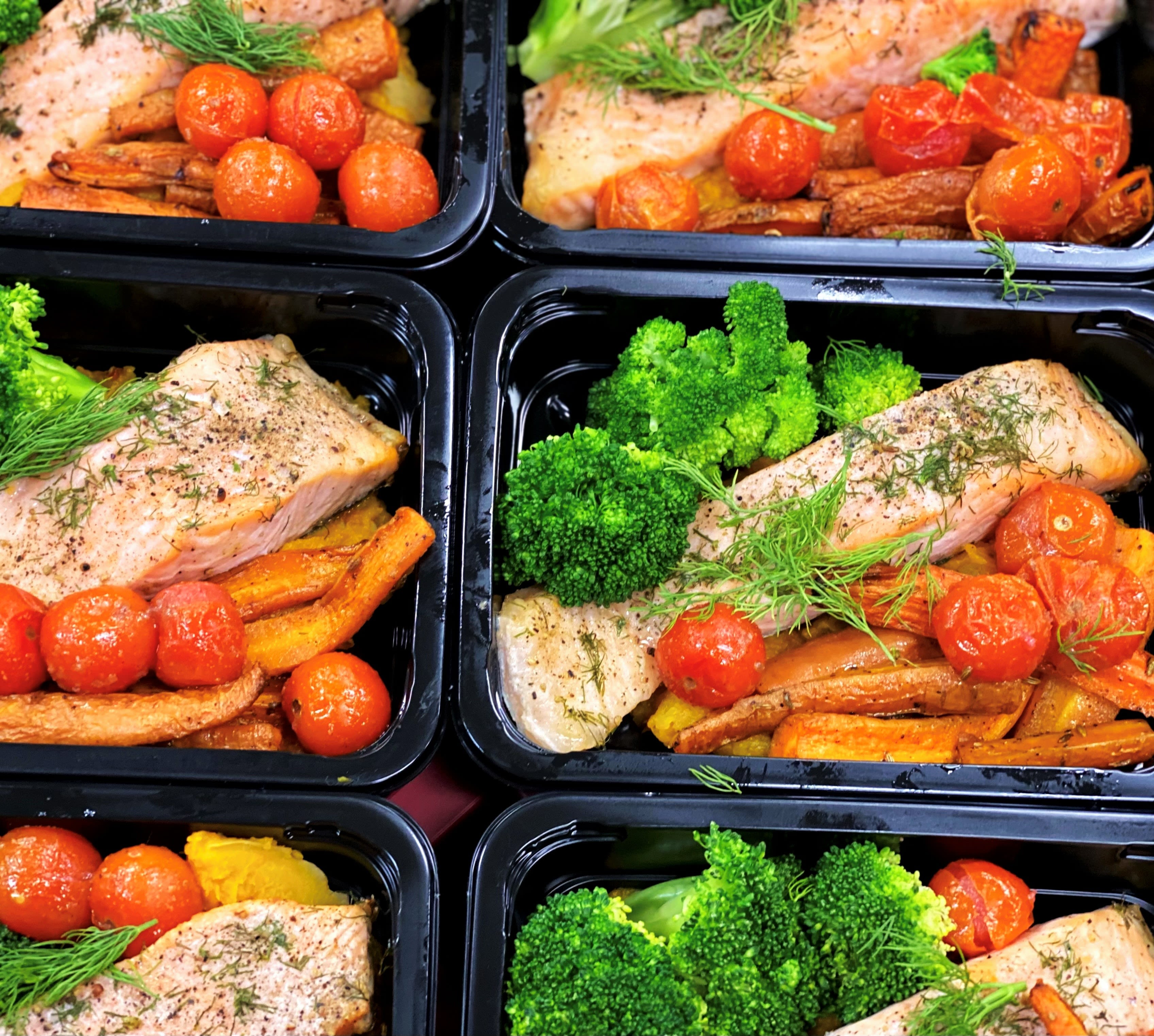
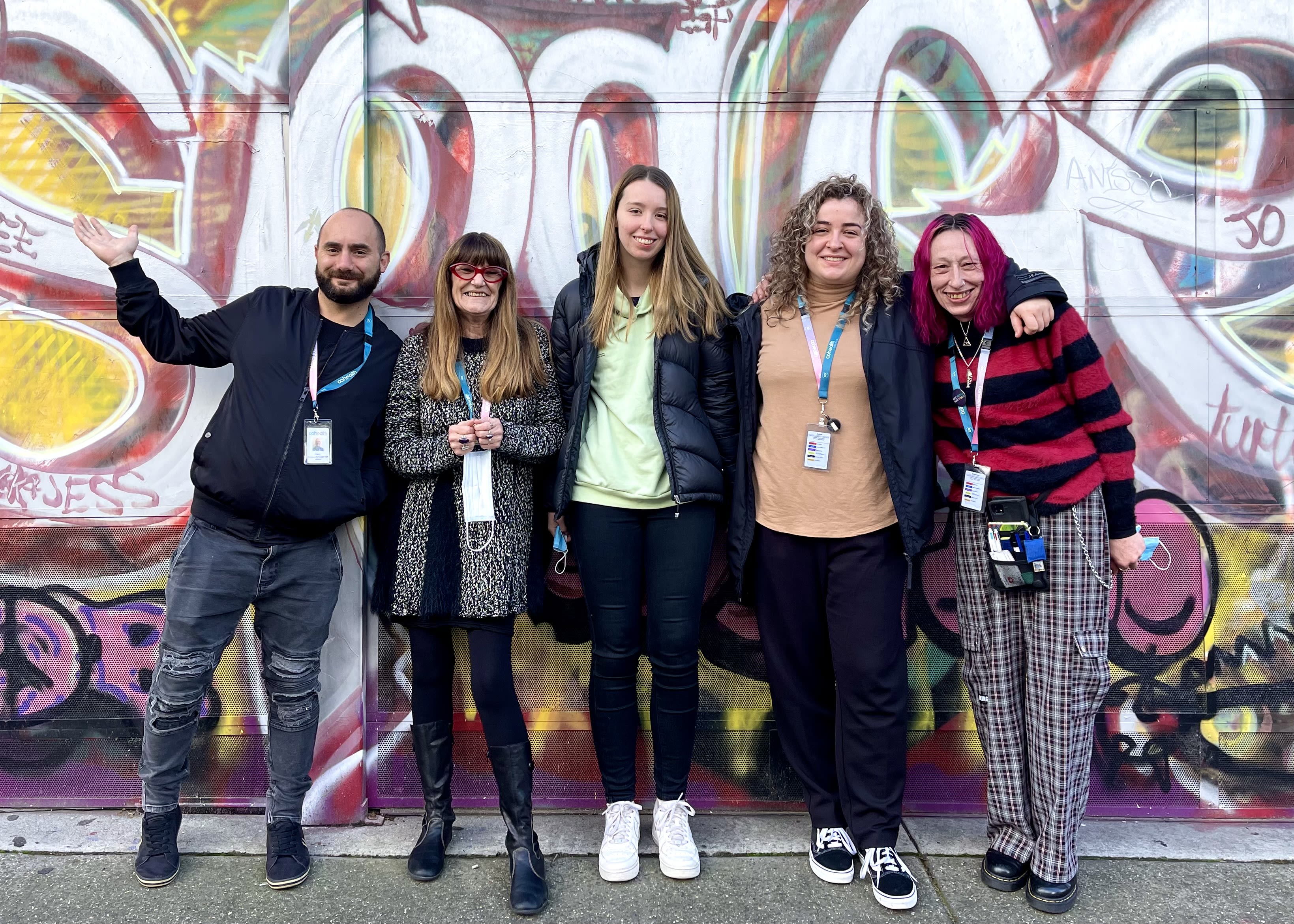
Cook

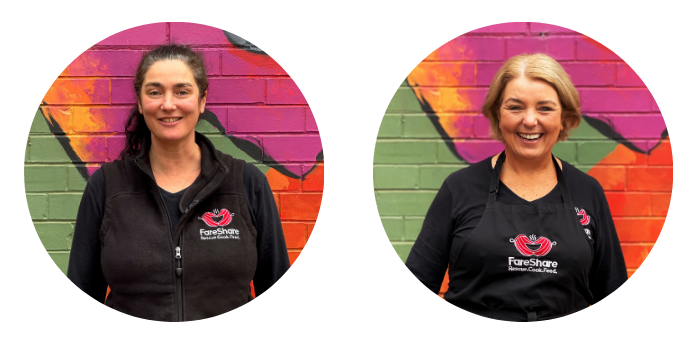
A message from our Melbourne Kitchen Managers Tania Visentini & Crickette Derjeu
What an amazing year it has been!
Our kitchen team has stepped up at every turn this year. We transitioned back to our volunteer workforce when COVID allowed; increased the number of high-impact, individual meals and pastries; and achieved HACCP certification for food safety with the added reporting, training, and supervising it entails. More importantly, we kept the kitchens running, losing only a single day of production due to COVID closures. We couldn’t be prouder of what the team has accomplished and of the quality of the meals we have cooked, from a taste, nutrition and presentation perspective.
We aim to provide our charity partners with the meals which best suit their clients, whether that be family-size casseroles, single-serve portions or individually-packed pastries. Tailoring meals to suit the people who need them takes more time and labour, but being able to offer a choice of meals using a variety of nutritious ingredients ensures equality and respect and is 100% worth it. We had fantastic support from the Victorian Government to employ staff and buy ingredients to increase our output over the year. Woolworths and ALH Group have also supported us with ingredients and staff when we had to suspend our kitchen volunteers. Without their support, our kitchens would have come to a slow halt.
There are multiple benefits of our new single-serve packaging. Not only do they present like a meal you would buy from a supermarket, but they ensure less wastage, added convenience, easier reheating and storage, improved food safety, wider choice and the ability to cater to more dietary and cultural requirements. They also allow us to rescue and cook a greater variety of food such as fish, roast meats, schnitzels and steaks. No wonder they are loved by the people who receive them!
Volunteer numbers may have been dramatically reduced since pre-COVID times, but their efforts have not. Our regulars continue to inspire us every day and together we have cooked more than one million delicious and nutritious meals. Our loyal regulars have come in for multiple extra shifts and embraced new kitchen protocols, systems and equipment. We simply could not be more grateful for their support.
We were fortunate to receive Government funding through various grants for labour and food ingredients which provided us with a variety of ingredients and spices to cook with.
As well as having wonderful, fresh produce from our gardens, we are also thankful for the regular support of Antonello Produce, Costa Farms, R Anguey Fresh and other traders.
We could not have survived the year without the help of Christian Lynch from LMOB Electrical, and Vaughn Hindle from Woolworths Maintenance, who provide constant maintenance and support to FareShare and are valued friends of the kitchen team.
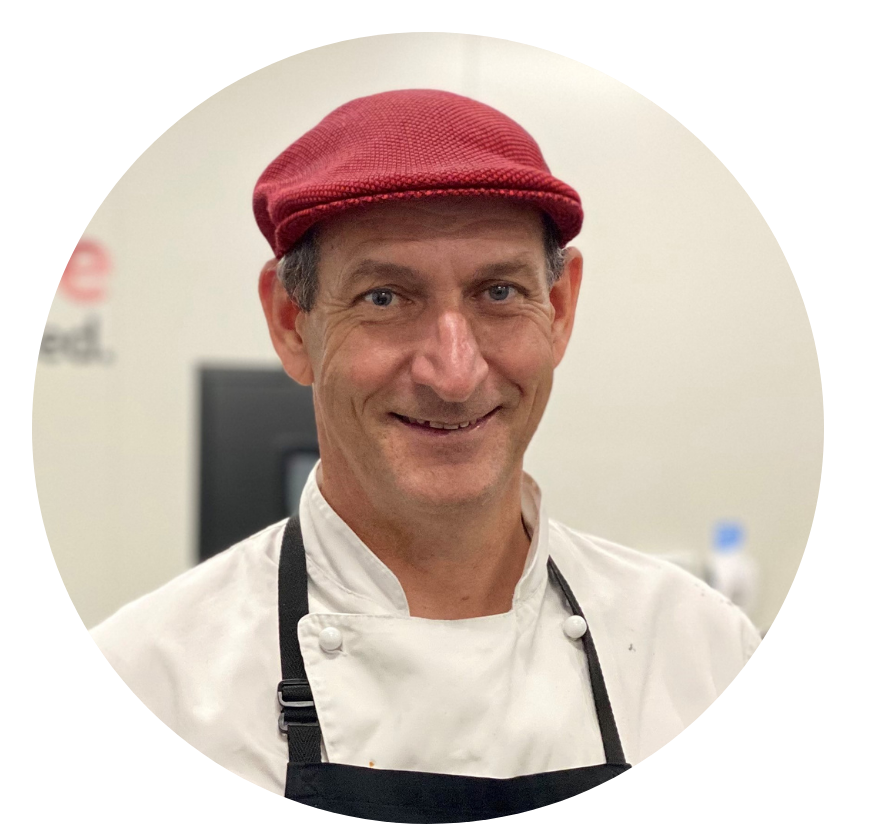
A message from our Brisbane Kitchen Manager James Fien
I can’t begin to describe the year without acknowledging the power and spirit of our volunteers. They are simply amazing.
Our communities were already struggling with COVID when we were hit by flooding in early February which stretched right across the state and into Northern New South Wales.
FareShare meals were some of the first to arrive in badly-affected areas including Rockhampton, Bundaberg, Maryborough, Lismore and Atkinson Dam. The damage was devastating and all up our kitchen cooked 90,510 meals for flood relief alone. We know these nutritious meals made a big difference when so many people were struggling.
During a very busy year we had no time to recognise our four millionth meal or the addition of a new 30-pallet coolroom to help us keep pace with demand for community meal relief.
We welcomed several new staff to the team who have embraced the challenges as our mission becomes more and more pressing. We also added new dishes to our menu including desserts to help use up surplus fruit.
As part of our support to First Nations communities, FareShare was invited to cook for the launch of Goondir Health Services’ new facility in Chinchilla (approximately 3.5 hours west of Brisbane). This was a great opportunity for over 100 guests to see firsthand the difference a nutritious FareShare meal can make.
The kitchen team has been excited by the opportunity to cater for First Nations communities and to welcome First Nations community members into our kitchen to cook Meals for the Mob. (Please see our Reconciliation report below for more details).
In October, FareShare’s Brisbane kitchen will celebrate its fourth anniversary. It’s been an amazing journey for the community through the pandemic, natural disasters and now crippling costs of living.
The kitchen team would like to thank the great volunteers, loyal supporters and donors who have helped us respond. With their continued support, we aspire to be there for those in our community who fall on hard times.
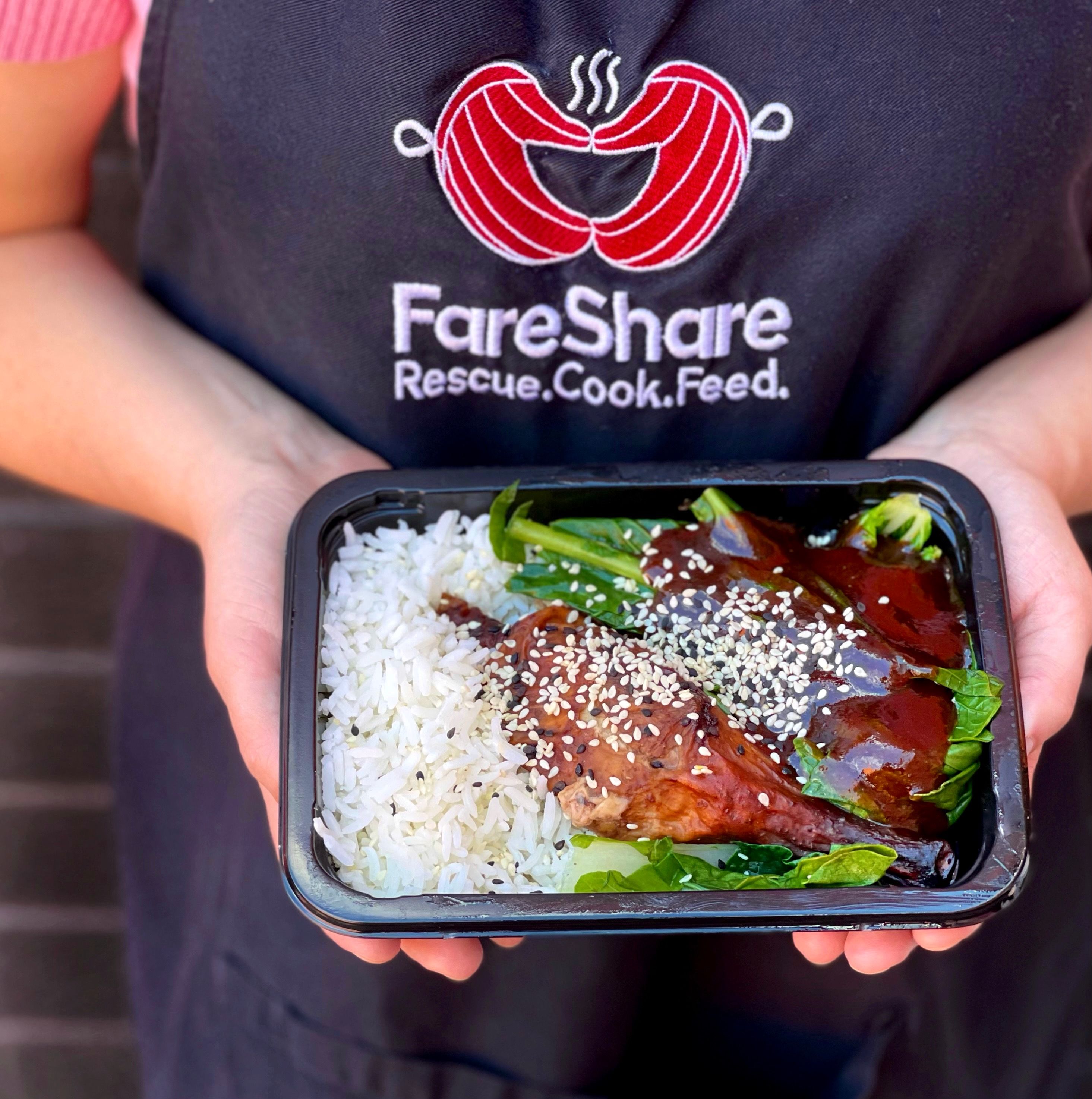
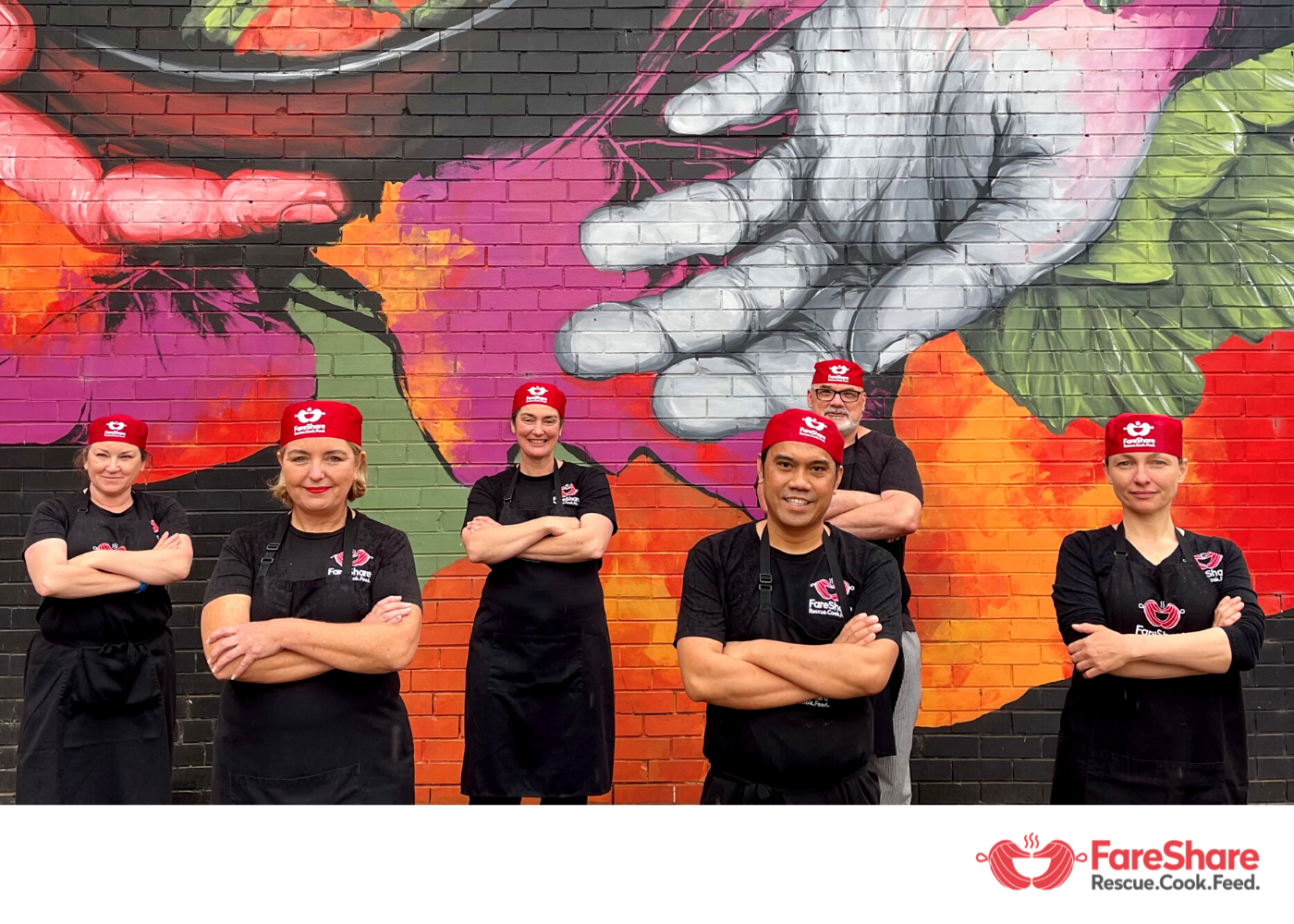
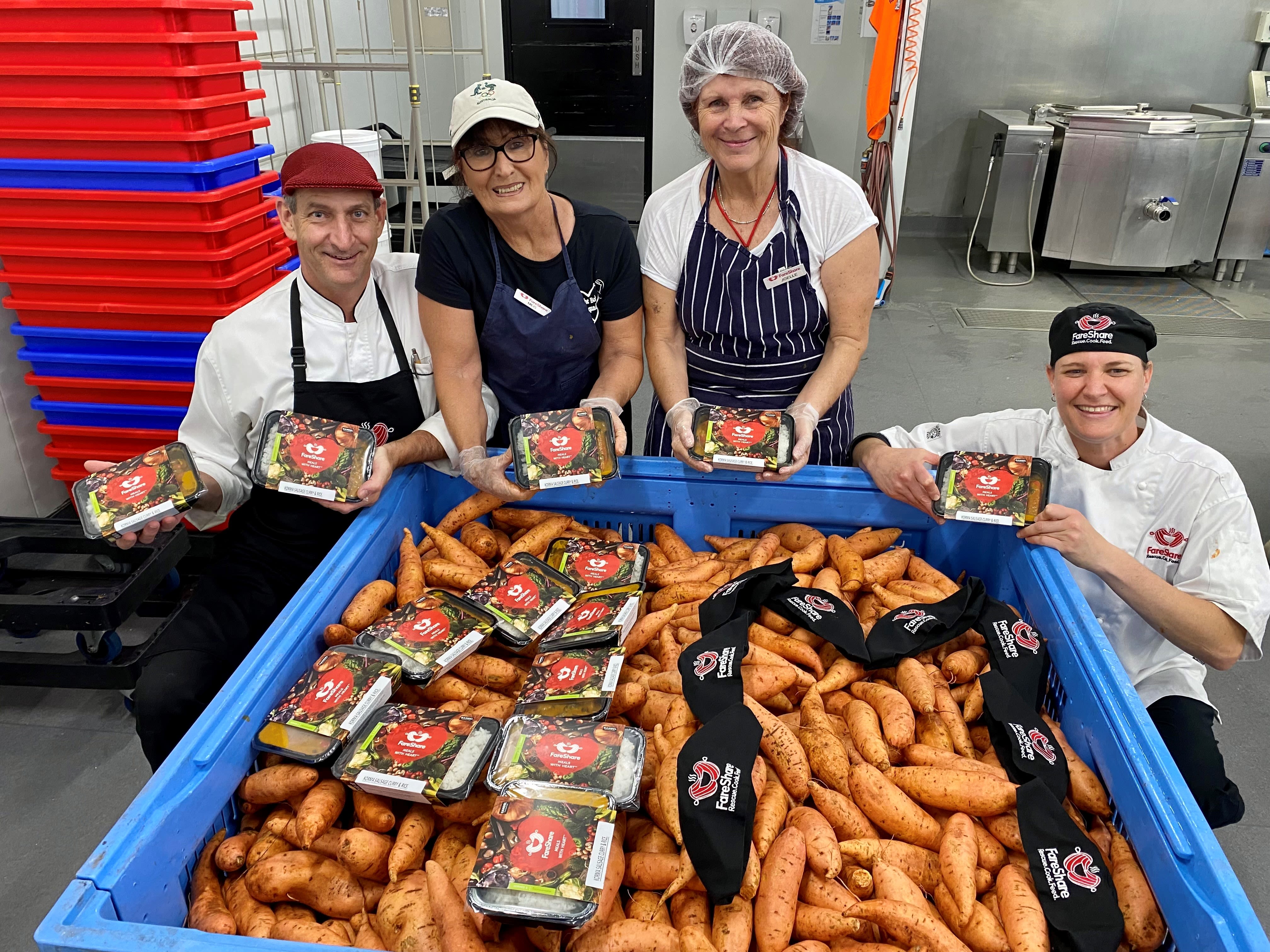
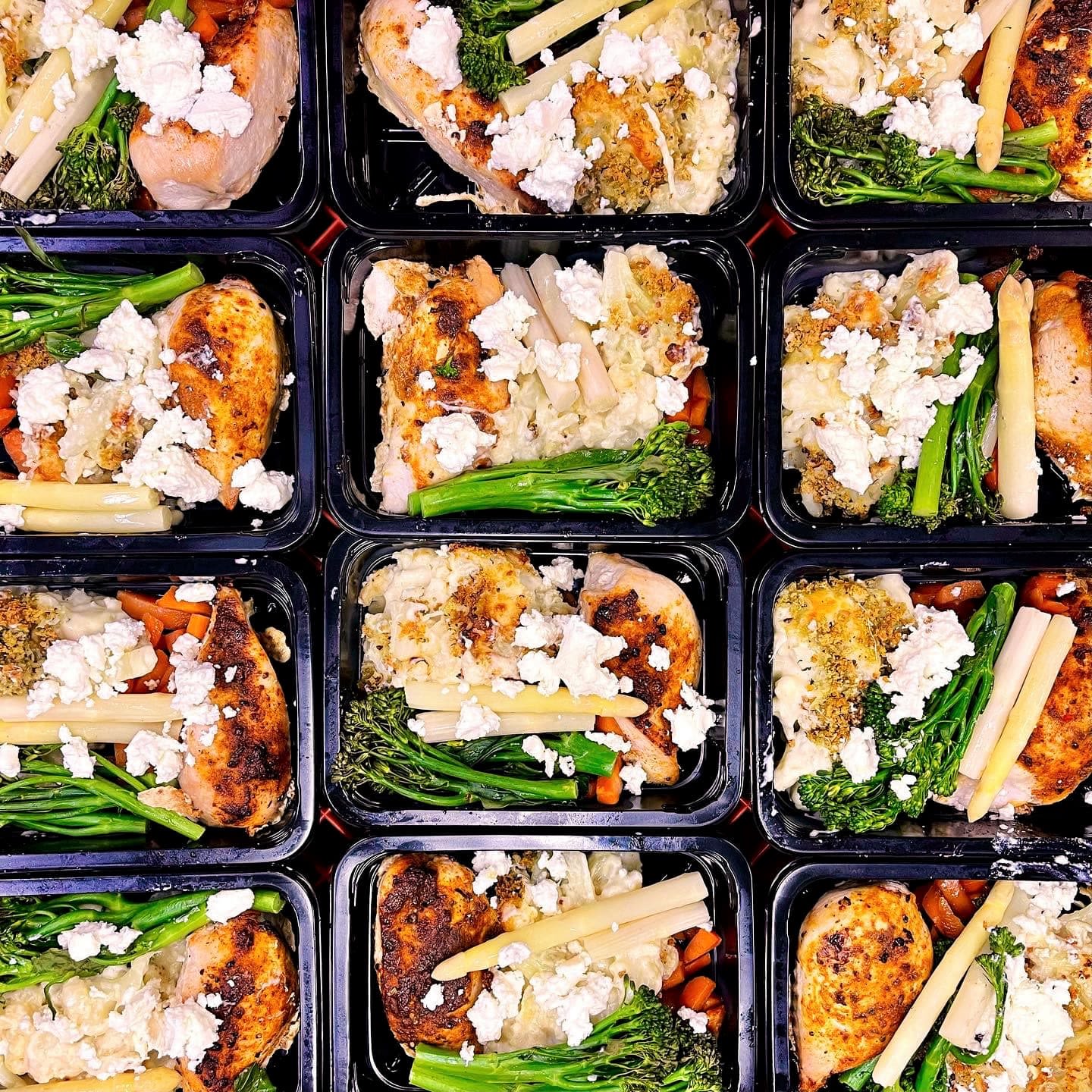
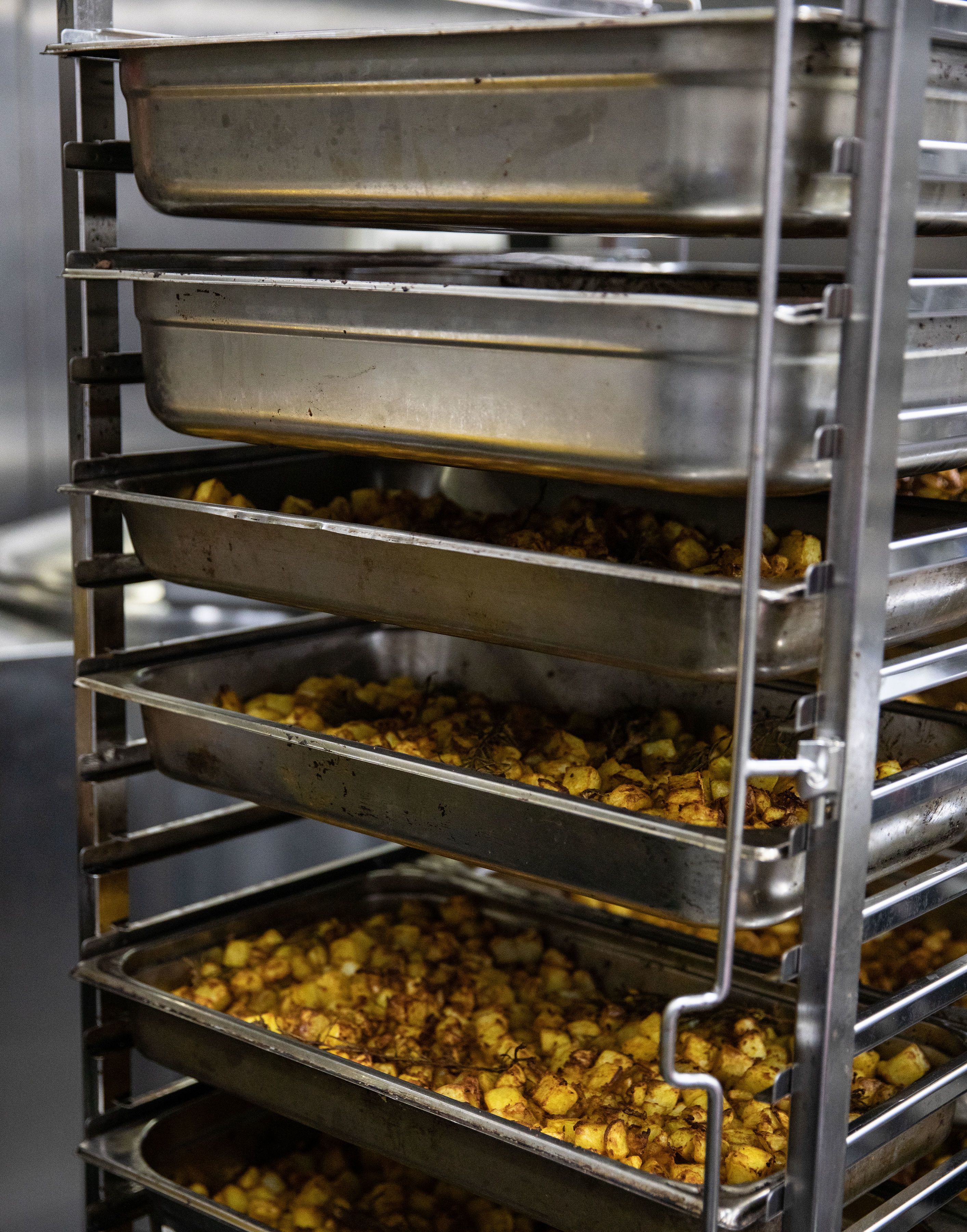
We thank our generous food donors who supply the quality ingredients we cook with
- 7 Chefs Pty Ltd
- Aldi - Distribution Warehouse
- AgTrade
- Antonello Produce
- Ashok Bombay Supermarket
- Atlas Masterclass
- Bendigo Foodshare
- Bidfood
- Big Valley Produce
- Billanook College
- Borthwick Foods
- Bureaux Collective
- Butler Market Gardens
- Cannings Free Range Butchers
- Carnegie Primary School
- Charlie’s Cookies
- Cheetham Salt
- Chef Good
- Chobani
- Chris and Gerald Drum
- Citycare Storehouse
- Coles
- Conga Foods
- Costa Farms
- Costco - Moorabbin
- Davies Bakery
- Dineamic
- Edgewise Insurance Brokers
- Eighteen Thousand Islands Pty Ltd
- Ezy Chef
- Father Bob Maguire Foundation
- Federation Village
- Ferrinda Fresh Pty Ltd
- Flavour Makers
- Fonterra
- Foodbank Queensland
- Foodbank Victoria
- Food For Change
- Fresh State
- Gazzola Farms
- G & K O’Connor Pty Ltd
- GreenMount Foods
- Greg’s Eggs
- Harry and Larry's Ice Cream
- Helping Hands Mission - Airport West
- Ivan’s Pies
- Kinross Farm
- La Manna Fresh - South Yarra
- La Villa Salami
- Little Bertha
- Make a Difference Office Machines
- Makmur Enterprises
- Mansfields
- M&J Ingredients
- McCain Foods
- Melbourne Market Authority
- Metropolitan Remand Centre
- NSM Food Wholesalers
- OzHarvest
- The Pastry Lounge
- Patties Food Pty Ltd
- Peter G Bouchier Butchers
- Peter Rowland
- Phillippa’s Bakery
- PK Logistics
- R. Anguey Fresh
- Rain Fresh
- Rinoldi Pasta
- SecondBite
- Shepparton Foodshare
- Simplot Australia
- Somerset Heritage Produce
- St David’s Dairy
- Sunny Seafood
- Tasty Chip
- The Fruit Box Group
- Thomas Food International
- Tunstall Fresh
- Upfield Professional
- V.F.S. Produce Pty Ltd
- Ward McKenzie
- Woolworths
- Zeally Bay Sourdough
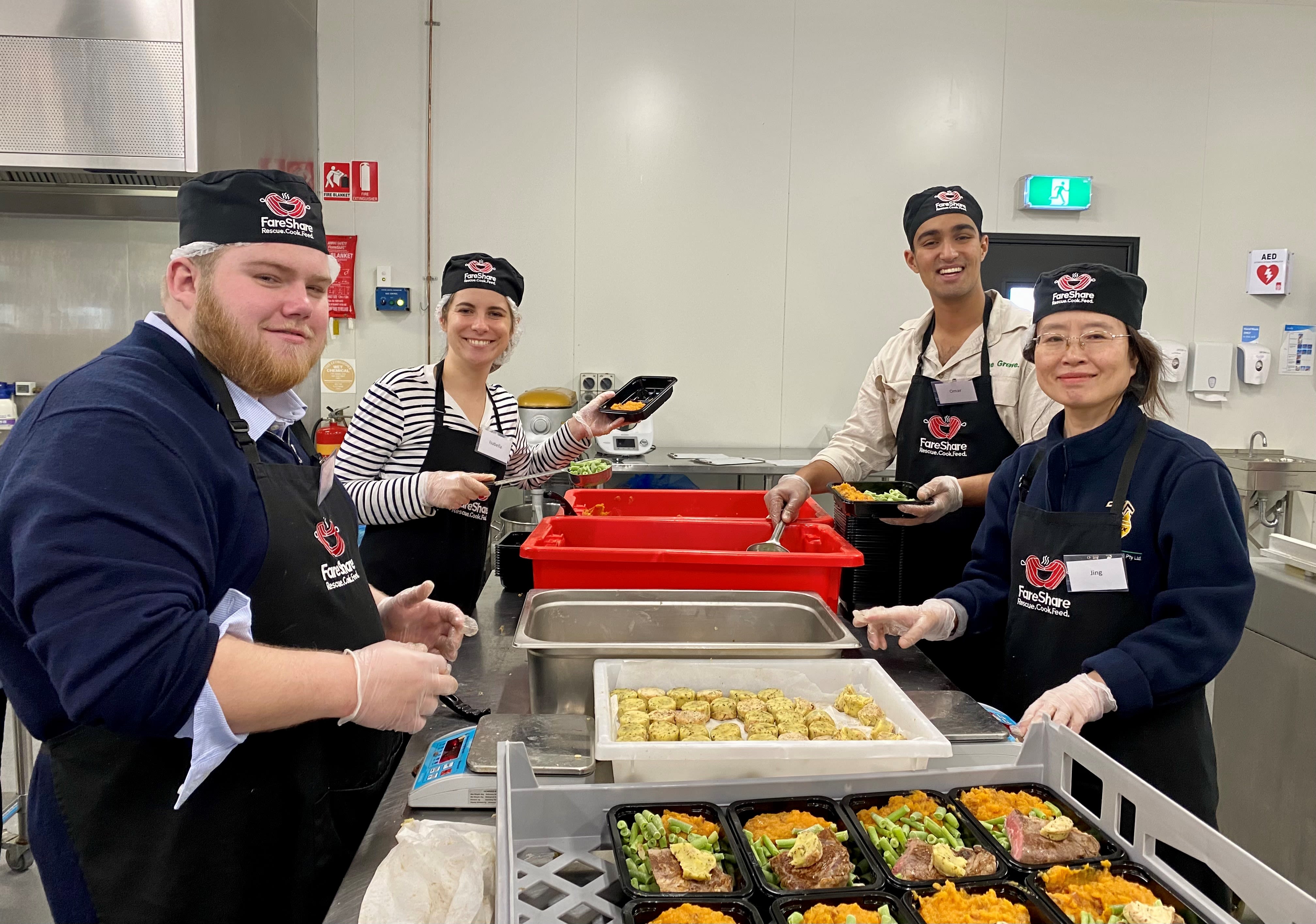
AgTrade kindly donate high quality meats
AgTrade kindly donate high quality meats
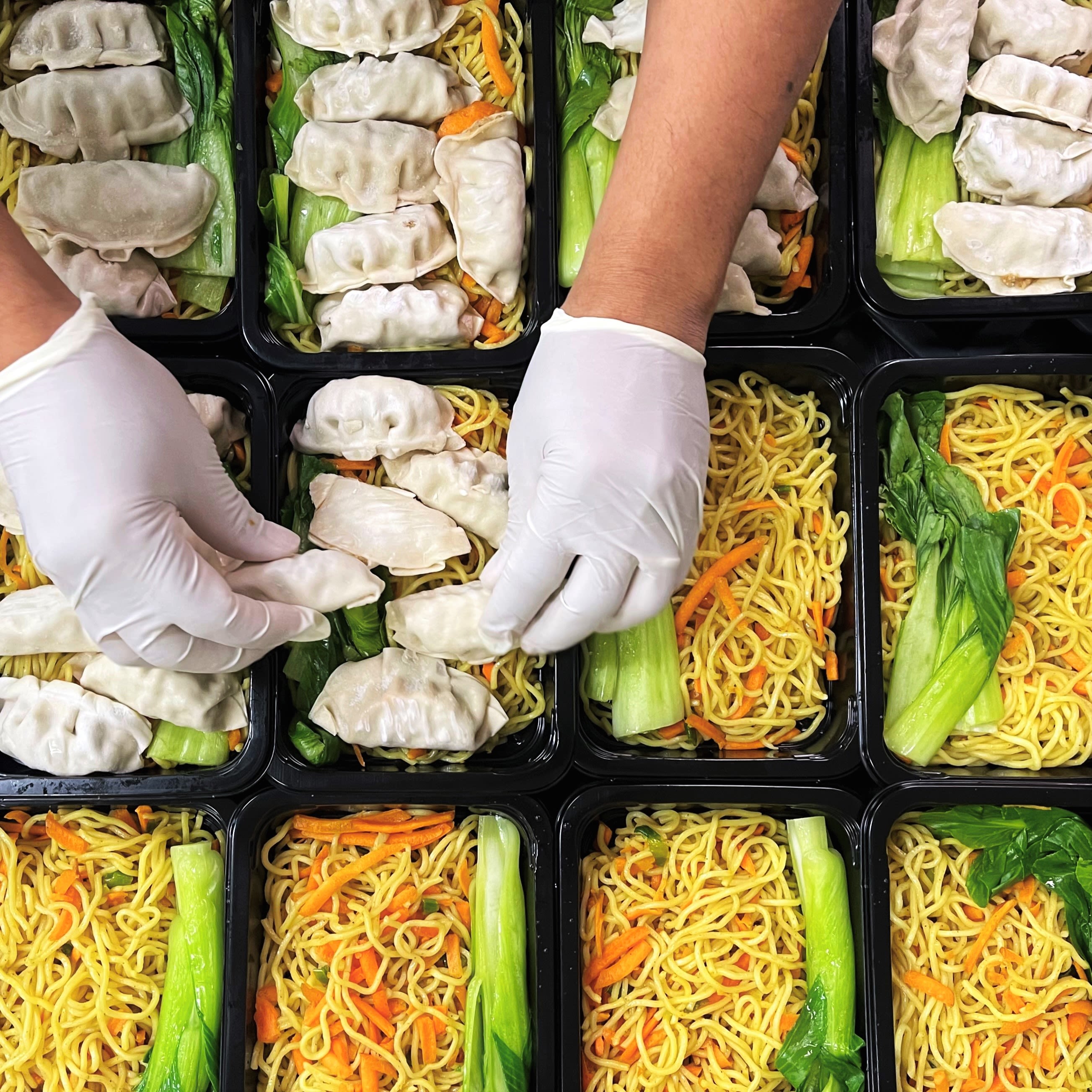
Makmur Enterprises generously donate their delicious dumplings
Makmur Enterprises generously donate their delicious dumplings
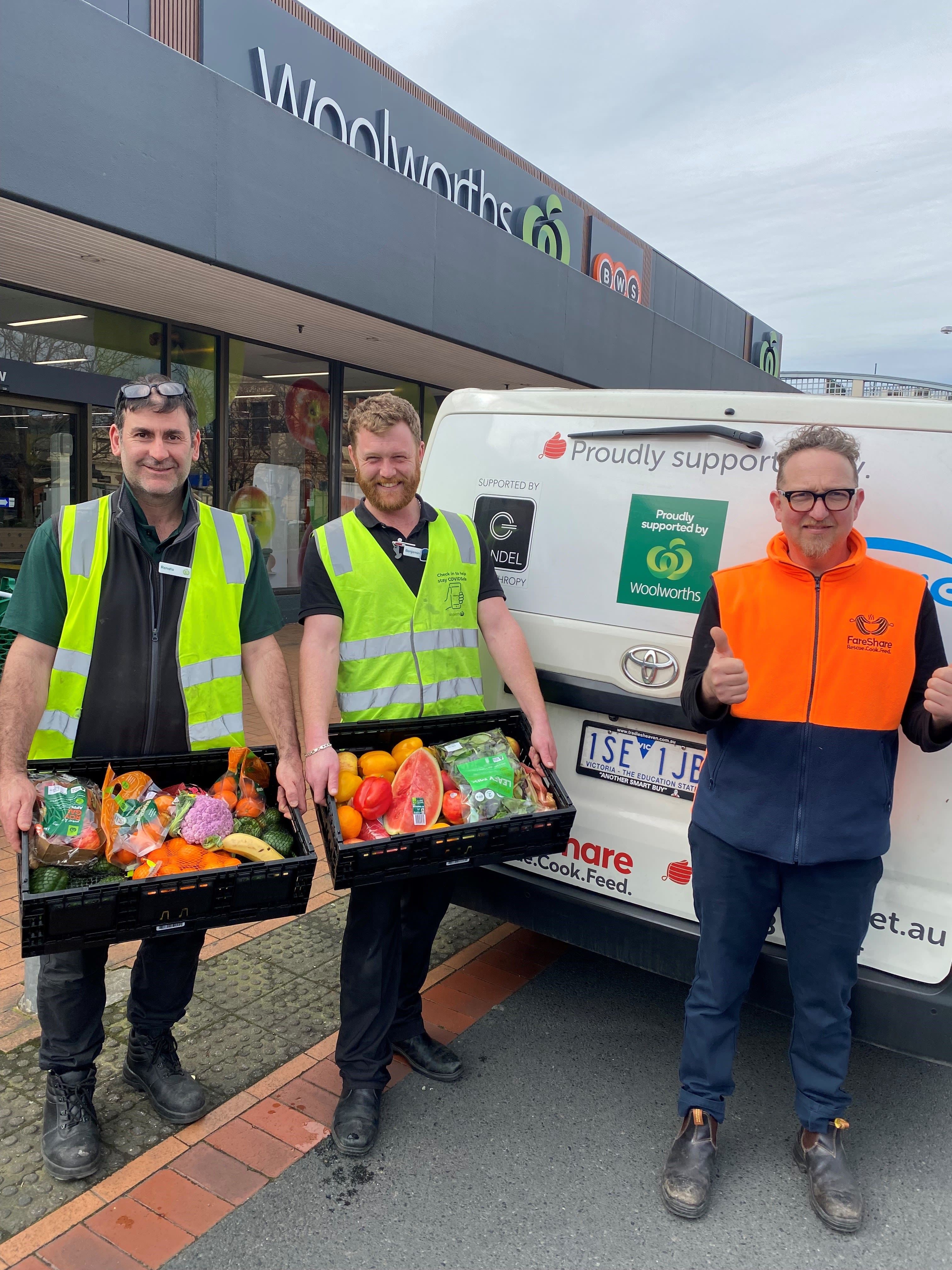
Woolworths, our biggest food donor
Woolworths, our biggest food donor
Grow

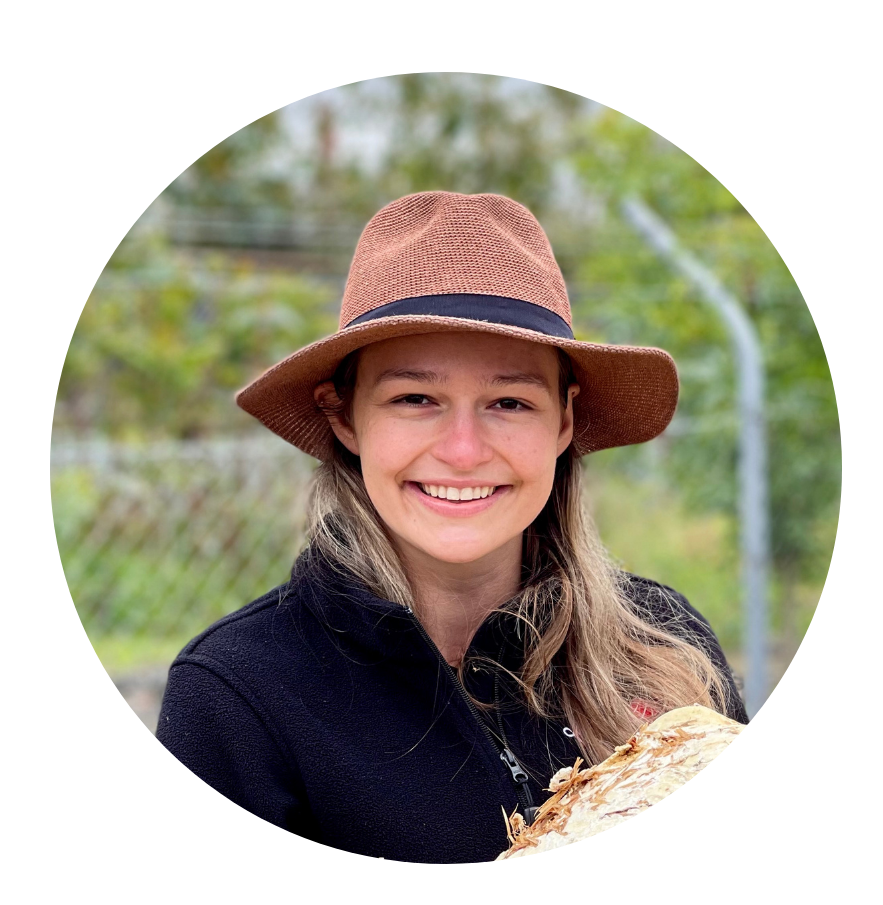
A message from our Garden Program Manager Isabel Menssink
Our kitchen garden program has a simple goal – to ensure a constant, variety of fresh vegetables is always available to add taste and nutrition to our meals.
The difficult time faced during lockdowns and restricted working hours for our garden volunteers meant our busy spring harvest season was particularly challenging this year. Our small team of staff and dedicated volunteers tackled the task with gusto, harvesting over 30 tonnes of fresh, seasonal vegetables in spring. Our biggest harvest month of October reaped 12,332 kg of vegetables for the kitchen!
Overall, we grew 84,190 kg of vegetables across our three gardens. Our top crops were leek (14,057 kg),fennel (14,291 kg), zucchini (10,591 kg) and cauliflower (9853 kg). As ever, the majority of our crop was grown on the Baguley family farm.
Our Abbotsford garden remained focussed on growing fresh leafy greens and herbs for the kitchen. It delivered thousands of kilos of bok choy and silverbeet, zucchini and spring onions as well as an array of fresh herbs including basil, coriander, thyme, parsley, sage, tarragon and dill. Tomatillos, native to Mexico and central America, proved a new kitchen favourite and ideal for salsas and sauces.
Our Moorabbin Airport garden's most productive crops this year were the much-loved golden nugget pumpkins, cauliflower and leek.
Our focus in the second half of the year was to better meet the kitchen’s needs and increase the diversity of vegetables grown. This year we grew 40 different crops, up from 28 in 2021. The diversity helps us better manage crop rotations, stagger the harvests of labour- intensive crops and provide a diversity of nutrients and flavours for our meals. Our garden volunteers are now regularly harvesting 6-10 different crops per week, which certainly keeps things interesting.
An undoubted highlight of the year occurred in May when our staff and volunteers welcomed 55 new volunteers to the Baguley family farm where we grow the bulk of our vegetables. This much-needed boost to our team has been wonderful as we get to know one another and work together to keep growing our skills and friendships along with the veggies.
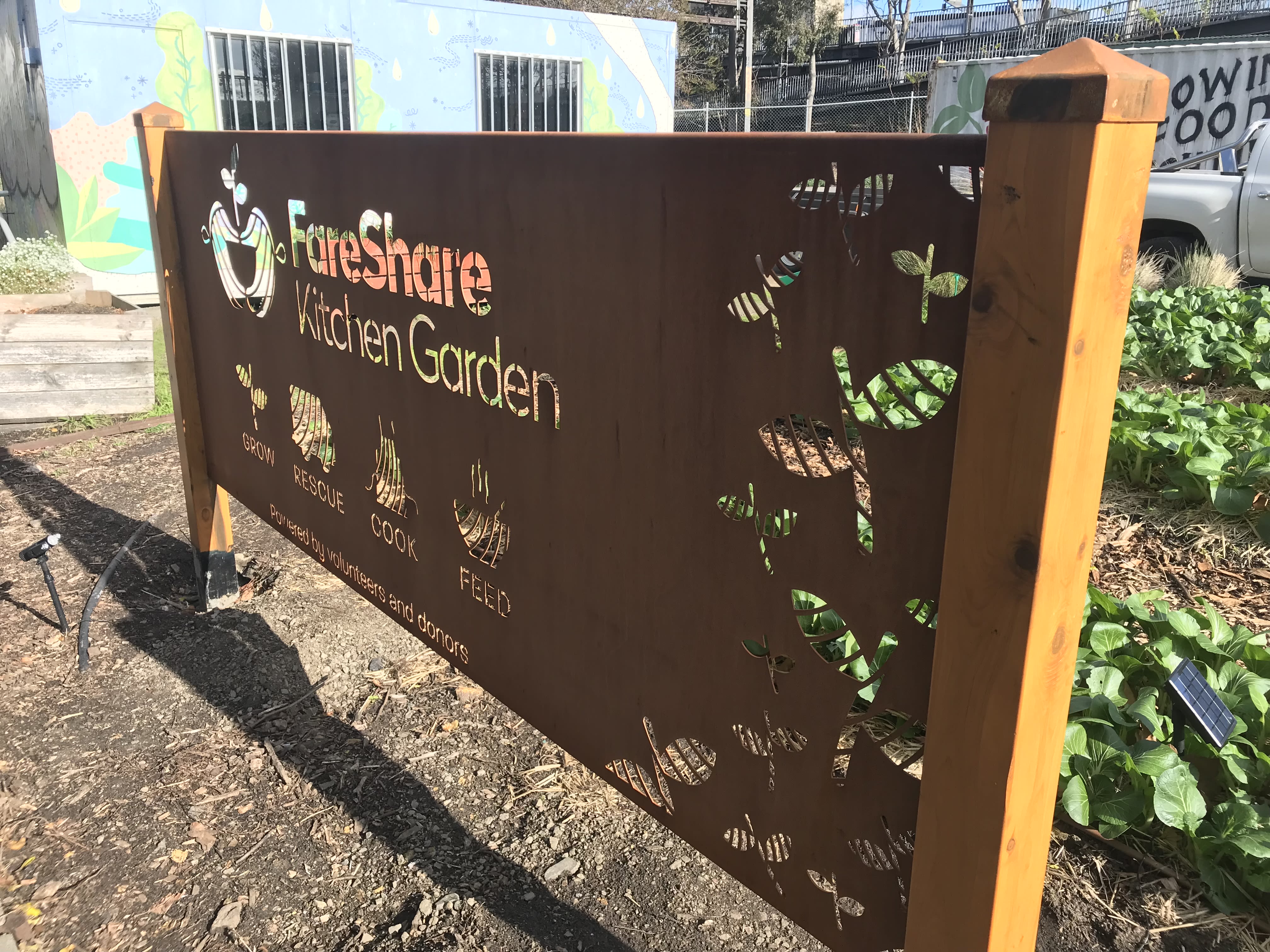
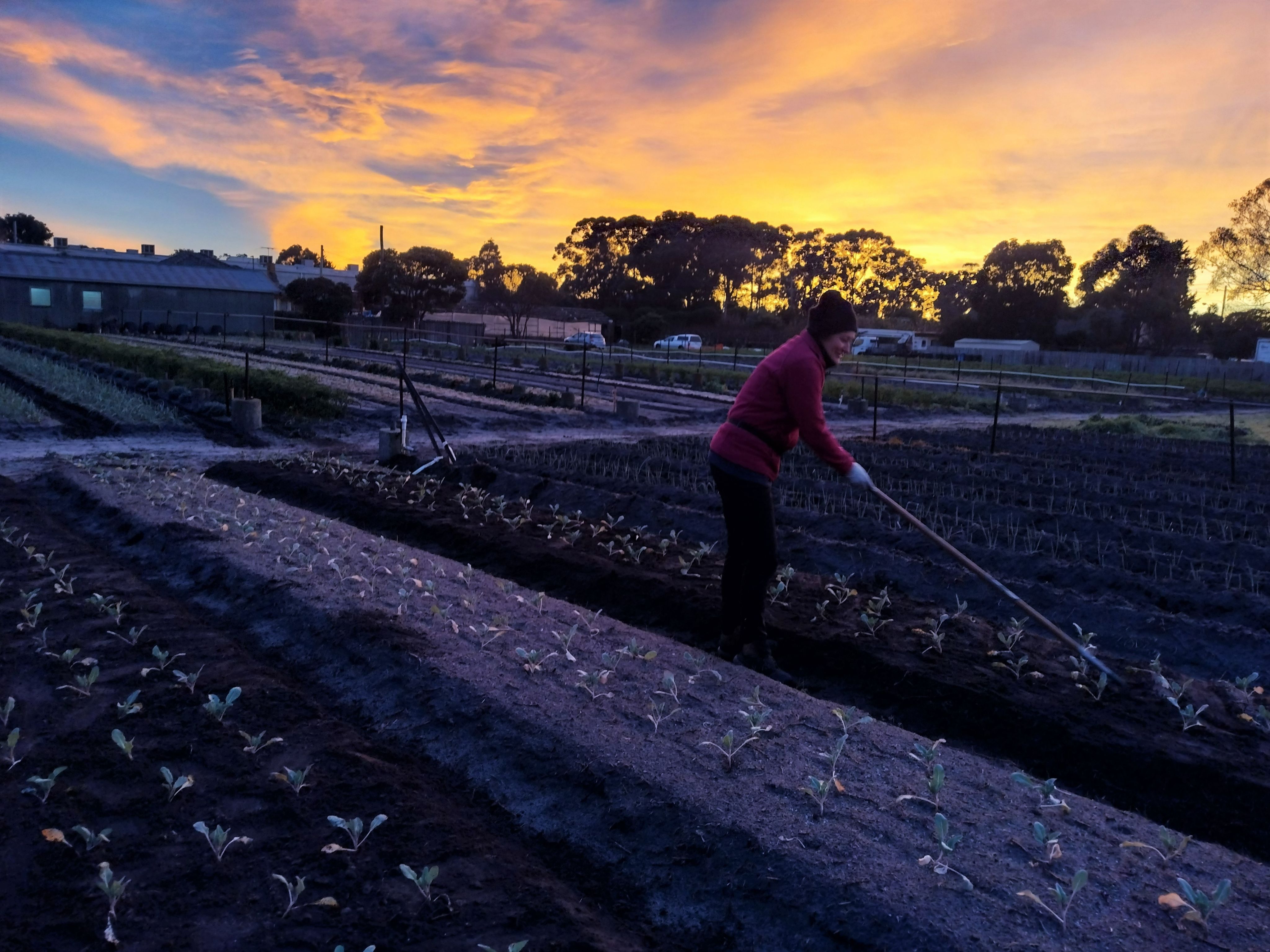
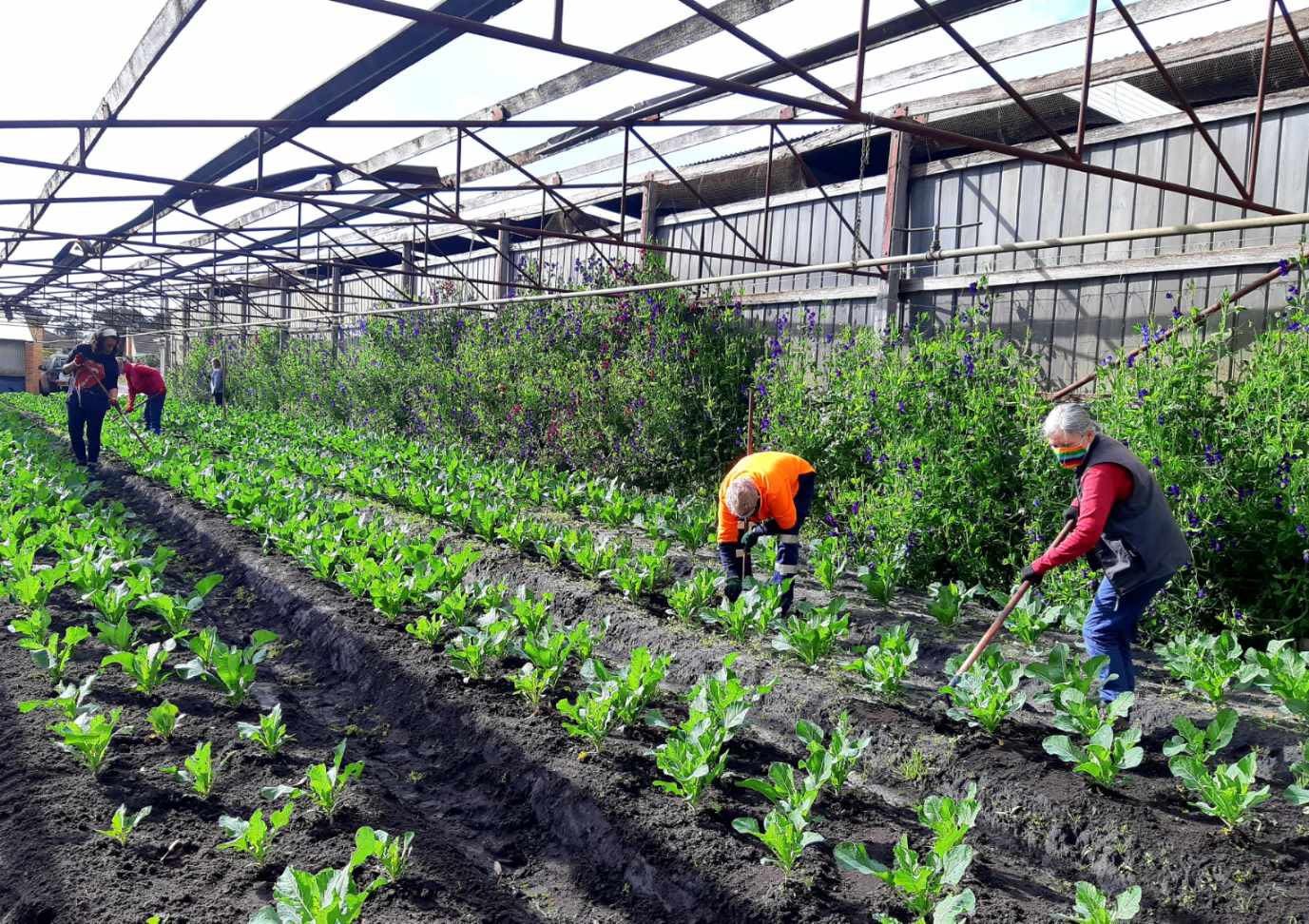
Special acknowledgments
- Baguley Flower & Plant Growers
- Bentleigh and Moorabbin Rotary Club
- Boomaroo Nurseries
- City of Kingston
- City of Yarra
- CropBioLife (Aussan Laboratories)
- Goodman Foundation
- Honey Fingers (Nic Dowse - beekeeper Abbotsford)
- John and Betty Laidlaw Legacy
- Lump Sculpture
- Moorabbin Airport Corporation
- Majestic Young Plants
- Marian and EH Flack Trust
- Plantfulness
- Plant Doctor
- Sporadical City Mushrooms
- University of Melbourne (Burnley Campus)
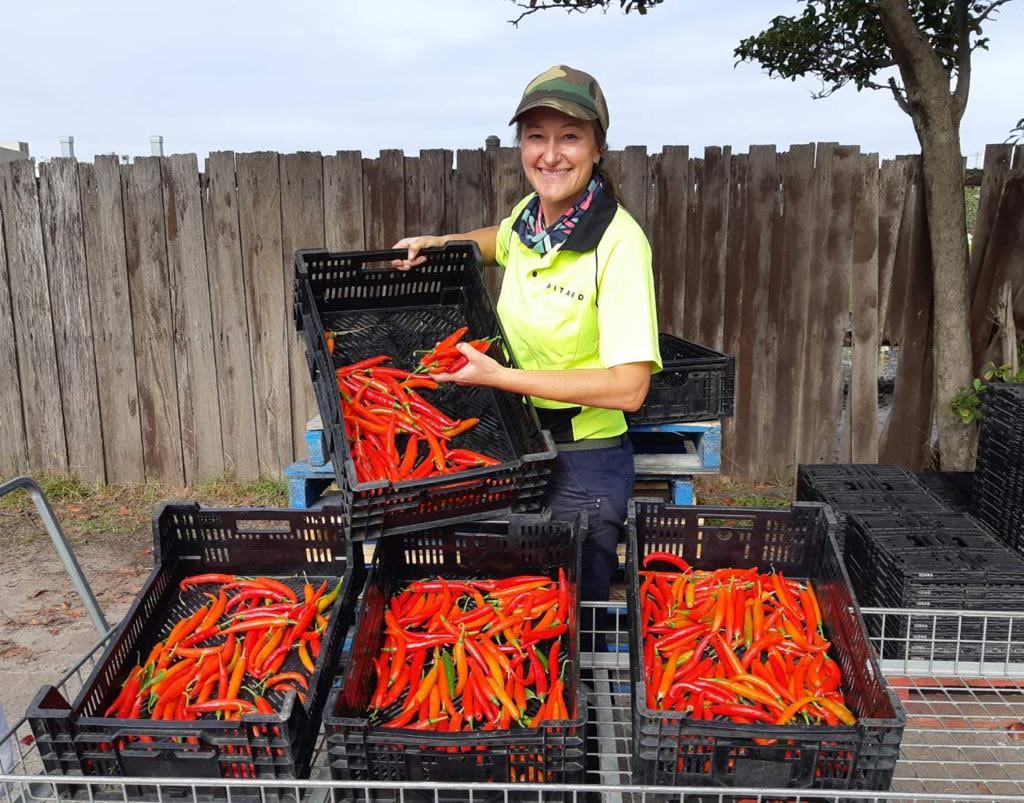
Rescue


A message from our Logistics Manager Patrick Lanyon
Food rescue is both an important source of ingredients for our kitchens and a positive contributor to the health of our environment by keeping valuable, but polluting, resources from going to landfill.
Over the past year we have rescued increased volumes of produce from more than 100 Woolworths stores in Victoria each week, benefiting from Woolworths’ strong investment in efforts to reduce food waste.
In addition, we have been the beneficiary of food that has been rescued by OzHarvest and SecondBite. We are grateful for this collaboration which has allowed us to cook more meals.
Our focus on accessing nutritious ingredients was also boosted by relationships with the Melbourne Market Authority and FreshState that have allowed us to rescue so much healthy produce from the wholesale market at Epping.
We have been fortunate that several food manufacturers reached out to donate products that may otherwise have gone to waste. Examples included frozen carrot spirals from Simplot and pasta from Rinoldi which were both put to excellent use by our chefs.
FareShare continues to distribute the bulk of our cooked meals to frontline charities in Victoria with SecondBite playing an important role.
After many years of collaboration, Melbourne Zoo ceased taking our food scraps for recycling into garden fertiliser. We are now exploring alternatives, including investment in our own biodigester, to ensure scraps such as pumpkin peel, meat bones and eggshells, can be turned into a useful resource.
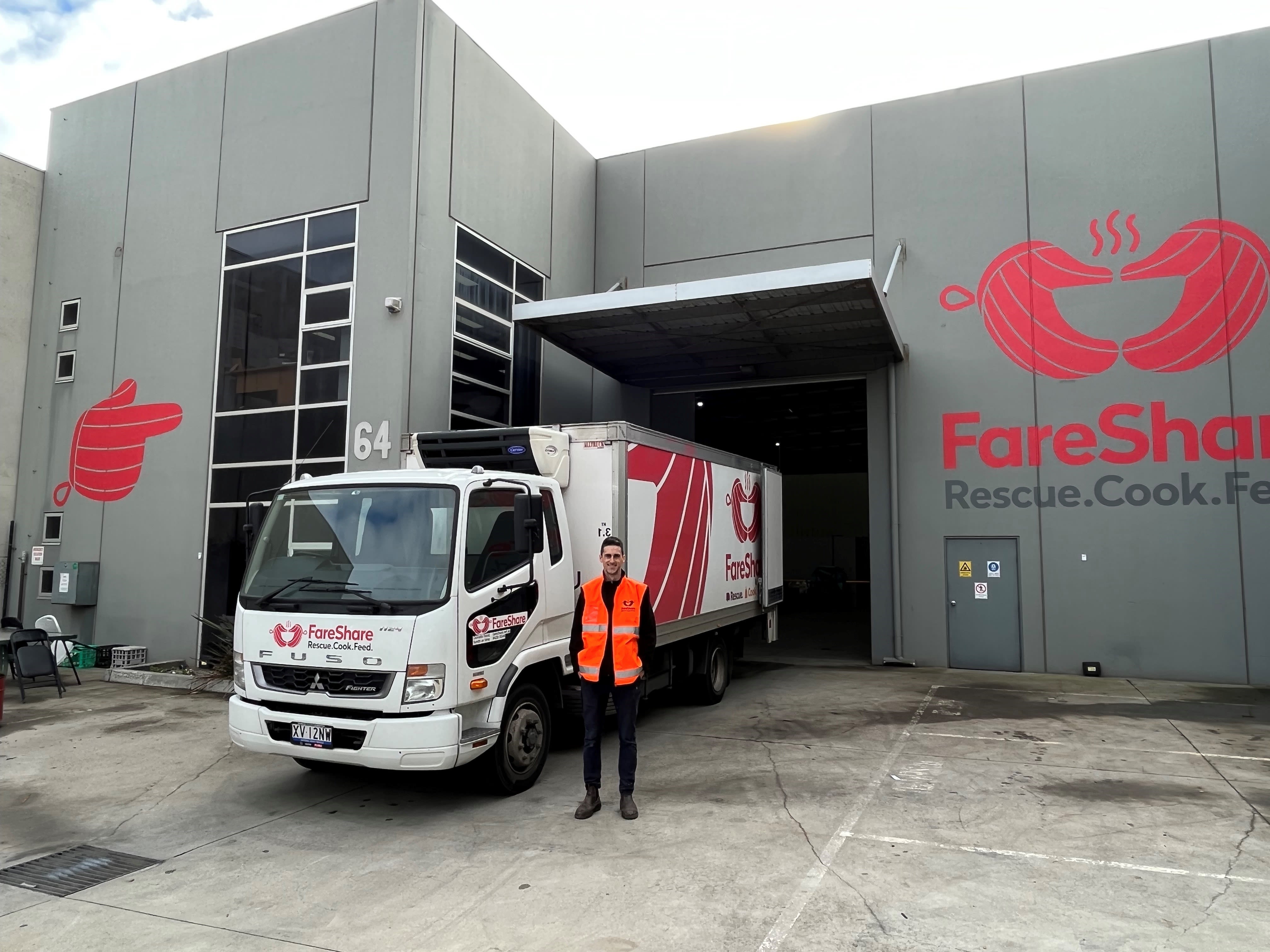
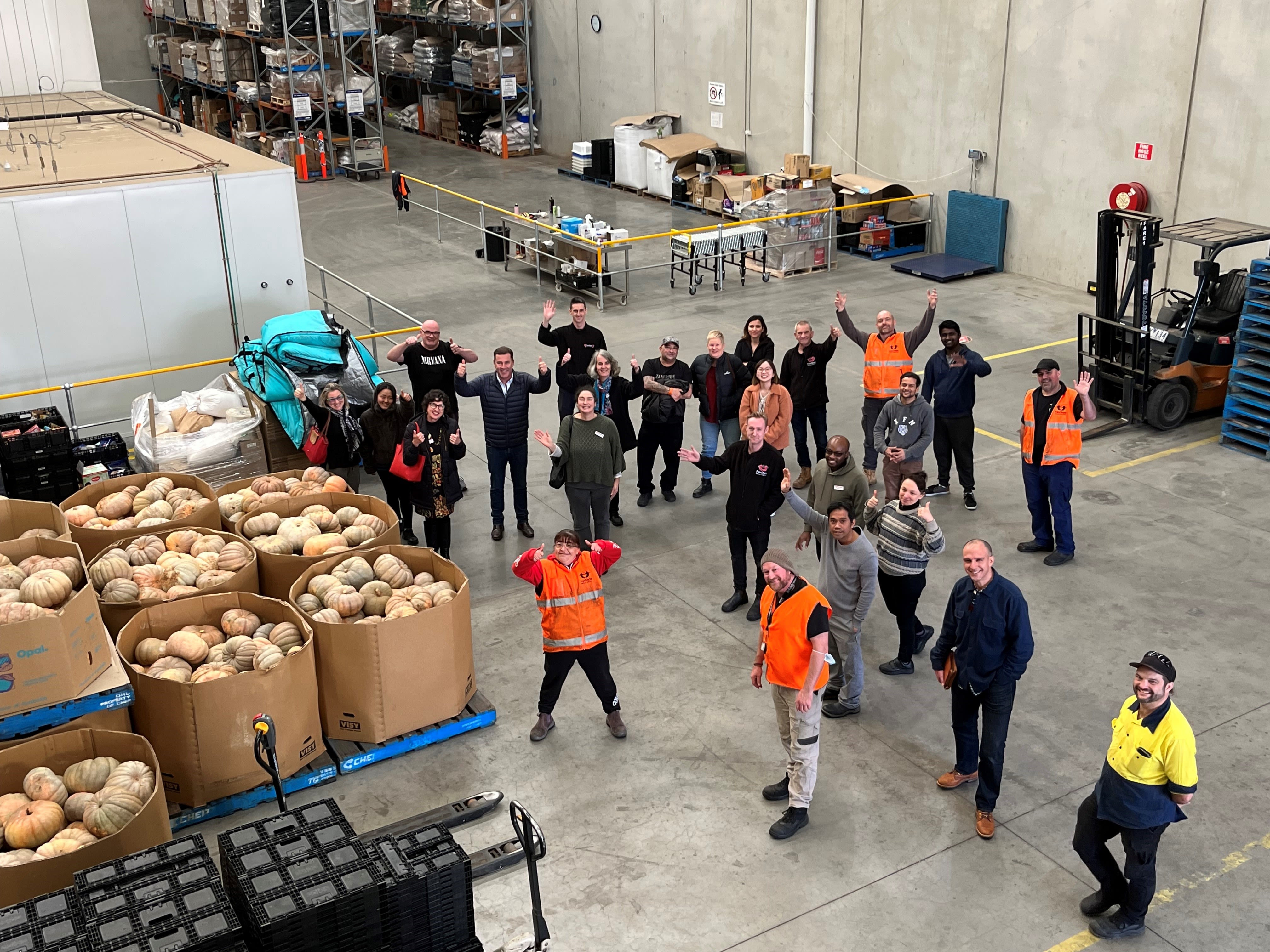
Feed

After a very tough year in 2021 with COVID and associated restrictions wreaking hardship across our communities, it was devastating to see the pandemic continue into 2022 with the added pain of natural disasters and cost of living rises.
As the need for our free, nutritious meals grew, the supply of ingredients and the availability of volunteers were both constrained. However, our focus and commitment remained the same. To cook the best meals possible and to get them to the people most in need.
This saw FareShare distribute more than 90,000 meals to communities devastated by floods in Queensland and Northern New South Wales.
Here are just a few of the stories from the frontline charities and meal recipients over the course of the year.
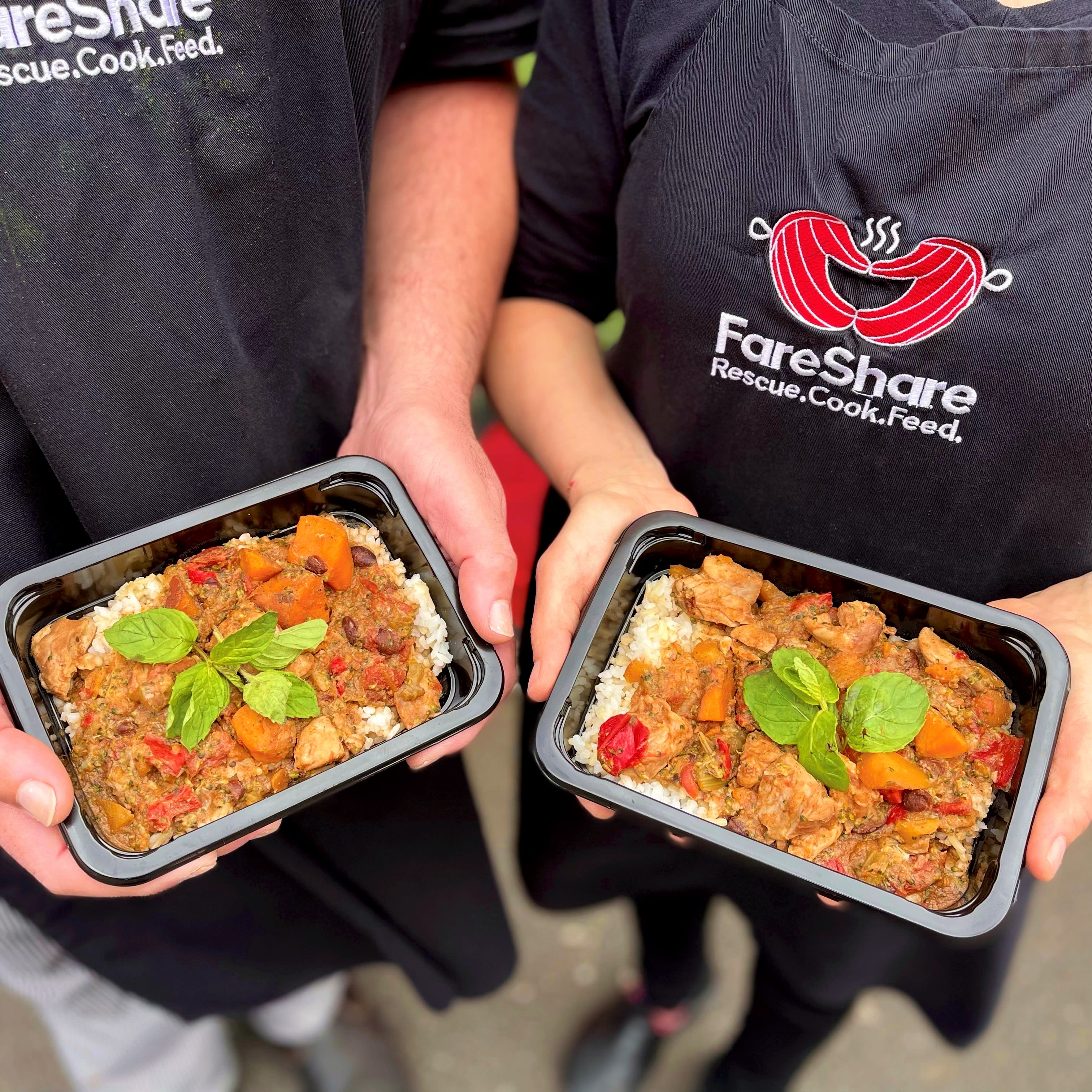
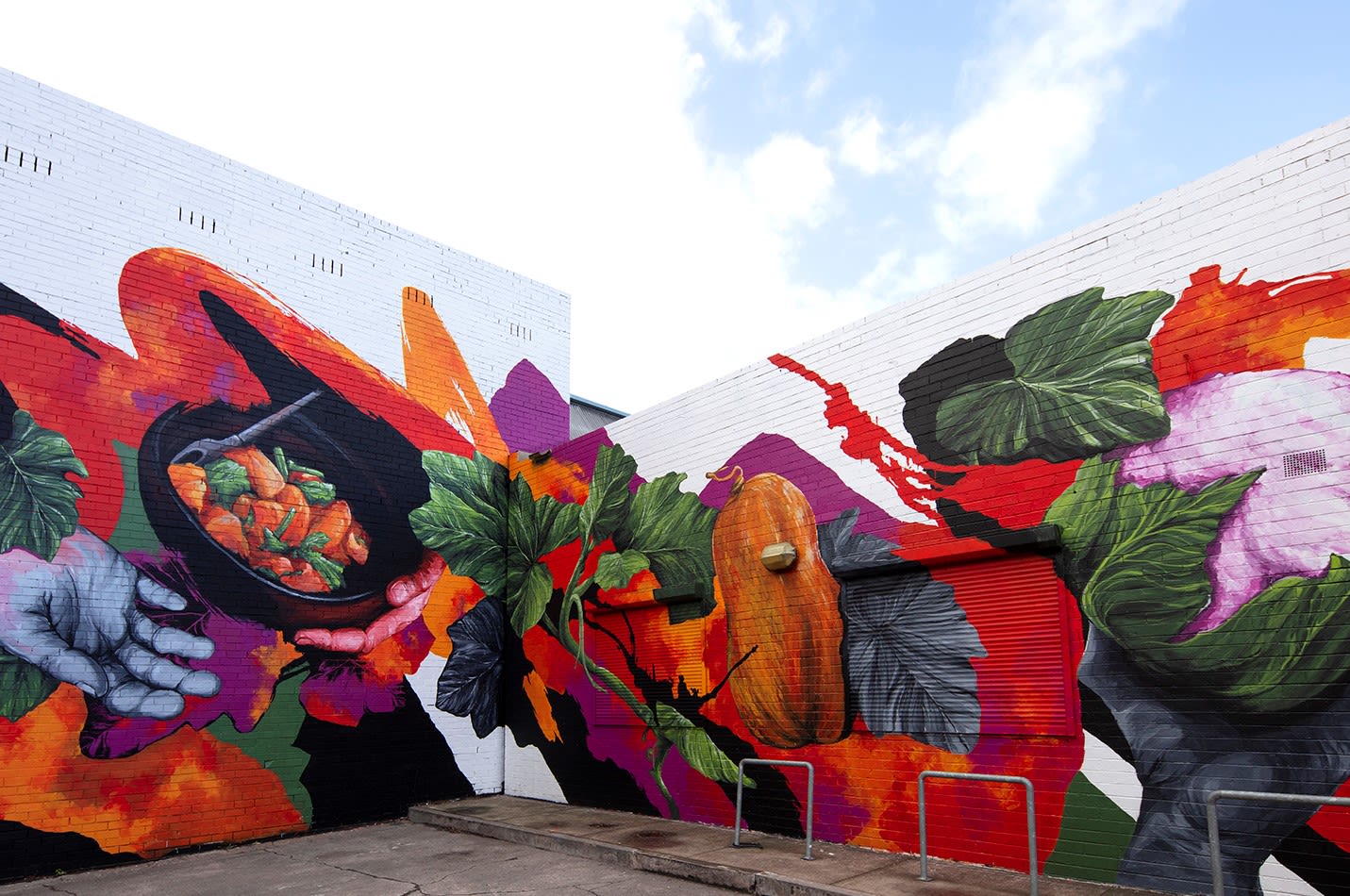
Our community
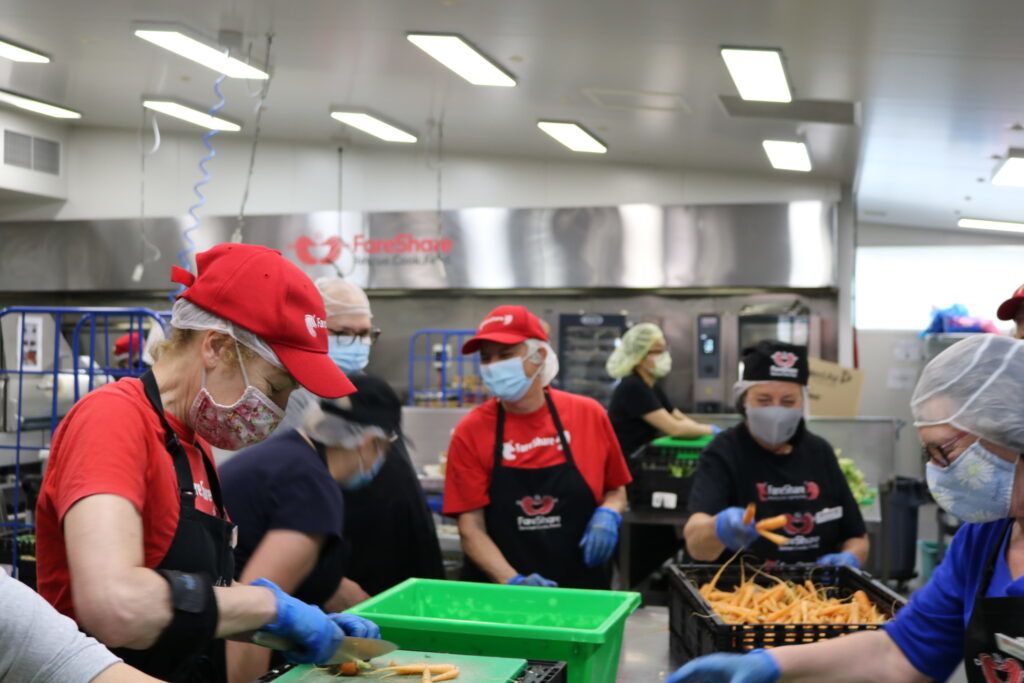
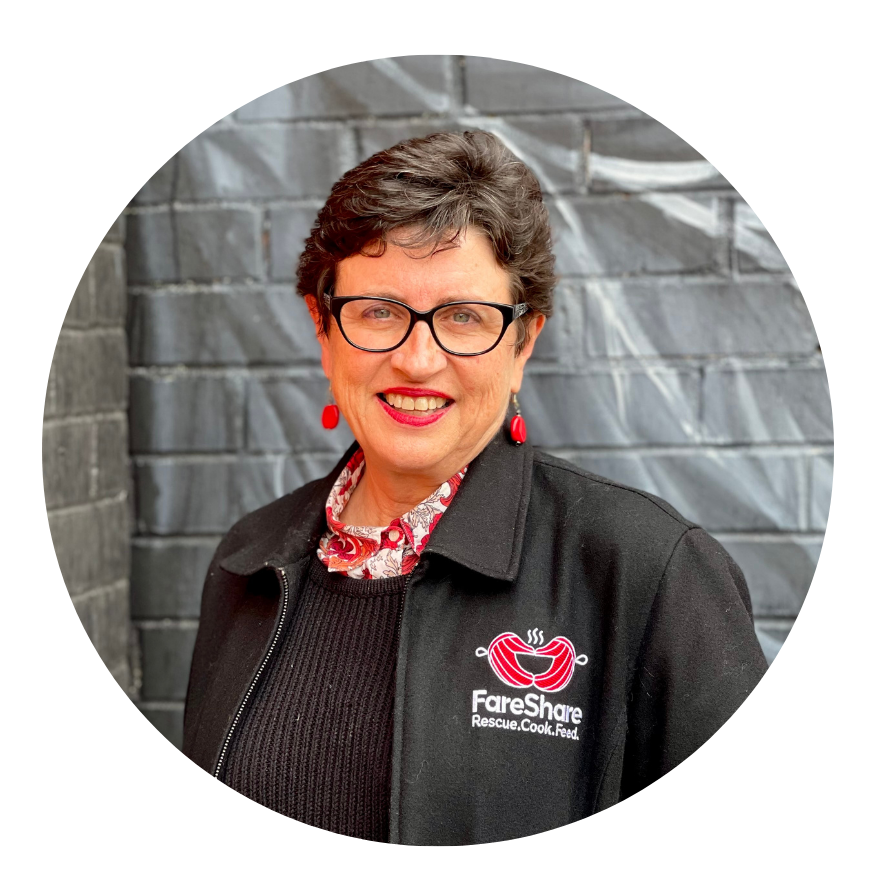
A message from our Victorian Volunteer Program Manager Rosemary Kelly
The past two years has been the most challenging in FareShare’s 21-year history. For an organisation which has always relied on a volunteer workforce, we have had to constantly adapt to maintain our operations.
With significantly fewer volunteers lending a hand, the day-to-day task of ensuring enough vegetables are grown and sufficient meals are cooked to fulfil frontline charity orders is a constant stress. However, relative to many other volunteer-powered charities, we consider ourselves fortunate to have welcomed back so many loyal regulars. Overall, more than 1,000 volunteers contributed 43,446 hours of service during the year in Victoria. We look forward to inducting many more in the coming months.
Regular volunteering
Once again, the pandemic posed serious challenges with lockdowns ensuring a bumpy ride during the second half of 2021.
Our driving, warehouse, garden and admin volunteers continued to provide invaluable support, carrying government worker permits when required.
Kitchen volunteering proved more problematic due to its indoor environment and the associated difficulties with social distancing. As a result, we reluctantly suspended kitchen shifts between July and November 2021.
When we reopened with health and safety front of mind, we found that many volunteers had made major changes to their lives and a significant percentage were either unavailable or still uncomfortable about returning. Not surprisingly, volunteer numbers have also been affected by higher than usual absence rates due to illness, isolation and long deferred holidays.
Despite these challenges, our annual volunteer survey in April revealed that our regulars are resilient folk who continue to feel very positive about their volunteering experience. More than two-thirds (68%) also volunteered elsewhere and of those 96% rated FareShare as very good or good, with 99% recommending FareShare to others as a place to volunteer.
Our top regular volunteer for the year was Joan Datson who volunteers in the kitchen, as a school supervisor and in the gardens. She clocked up an astonishing 750 hours over the 12 months.
Schools in the Kitchen Program
With the school program suspended during 2020-2021, we piloted an online program to interested schools in term 4 of 2021. This was not designed to replace our popular school volunteering experience but provided some context and information to students and teachers about FareShare and our mission.
We were delighted to reignite the full kitchen experience in March 2022 following a two-year suspension and to roll out new educational resources (pre and post shift) to deepen the engagement experience and ongoing impact of the program.
We were also pleased to appoint Pauline Malkoun, who has many years’ secondary teaching experience, as our new Schools Program Co-ordinator in April.
Since the resumption of the program, feedback from students and teachers alike has been glowing with most of our school shifts now booked for the remainder of the year.
We were grateful to secure funding to subsidise the program for schools serving areas of disadvantage from the Lord Mayor’s Charitable Foundation and the Freemasons Foundation.
Corporate volunteering program
COVID cast the same long shadow over our corporate volunteering program with shifts in the kitchen and garden cancelled from mid-2021 as working from home became the norm.
When restrictions eased in November 2021, our kitchen gardens welcomed back work groups keen to help out in the great outdoors. Kitchen volunteering also resumed with some understandable hesitation from some organisations.
It wasn’t until February 2022 when further restrictions were eased and the government encouraged workers to return to their workplaces, that interest really picked up.
Corporate volunteering at FareShare offers the perfect opportunity for work colleagues to re-connect after so much time spent on screens. Bookings have been brisk and we were pleased to welcome many new businesses and organisations who have found the experience rewarding and enjoyable.
Volunteers have been the heart and soul of FareShare for over 20 years and this year we have been even more grateful for their incredible support and commitment.

A message from our Queensland Volunteer Program Manager Madison Buik
The last 12 months have seen COVID continue to cause disruptions, cancellations, and challenges for everyone. I am incredibly proud of the continued commitment from our regular volunteers who tirelessly roll up their sleeves and chop veggies, pack meals and jump in the FareShare van to deliver meals to urban and regional communities.
Early 2022 saw horrific floods cause serious damage in Brisbane and to our southern neighbours in Northern NSW. Some of our own volunteers were impacted by these destructive floods, and yet knowing there were people who had suffered more they still showed up for their shifts after spending the weekend rectifying water damage and clearing mud from their homes.
During this time, we saw an increase in demand for our meals, especially in Northern NSW where our kitchen team sent thousands of meals to assist those who had lost everything in the floods. This grew the sense of community among the volunteers who were more than happy to chop hundreds of kilos of vegetables and pack thousands of meals on their shifts to be of service. We couldn’t have provided over 90,000 flood relief meals without this support.
Our Corporate Volunteering program is continuing to grow in Brisbane. Over the last 12 months we have welcomed many new teams into our Brisbane kitchen. All walk away feeling incredibly satisfied with what they have accomplished during their three-hour shift. Many corporate volunteers have such a good experience they register to join our regular volunteer taskforce and continue the good work. A big shoutout to the corporate teams who reached out during the floods to offer their support and organised ‘emergency flood relief’ teams to jump in the kitchen to help us cook.
Finally, a big thank you to all Queensland volunteers both regular and corporate for your efforts this last year. You continue to amaze us with your dedication to FareShare and your commitment to assist your community with the best possible meals.
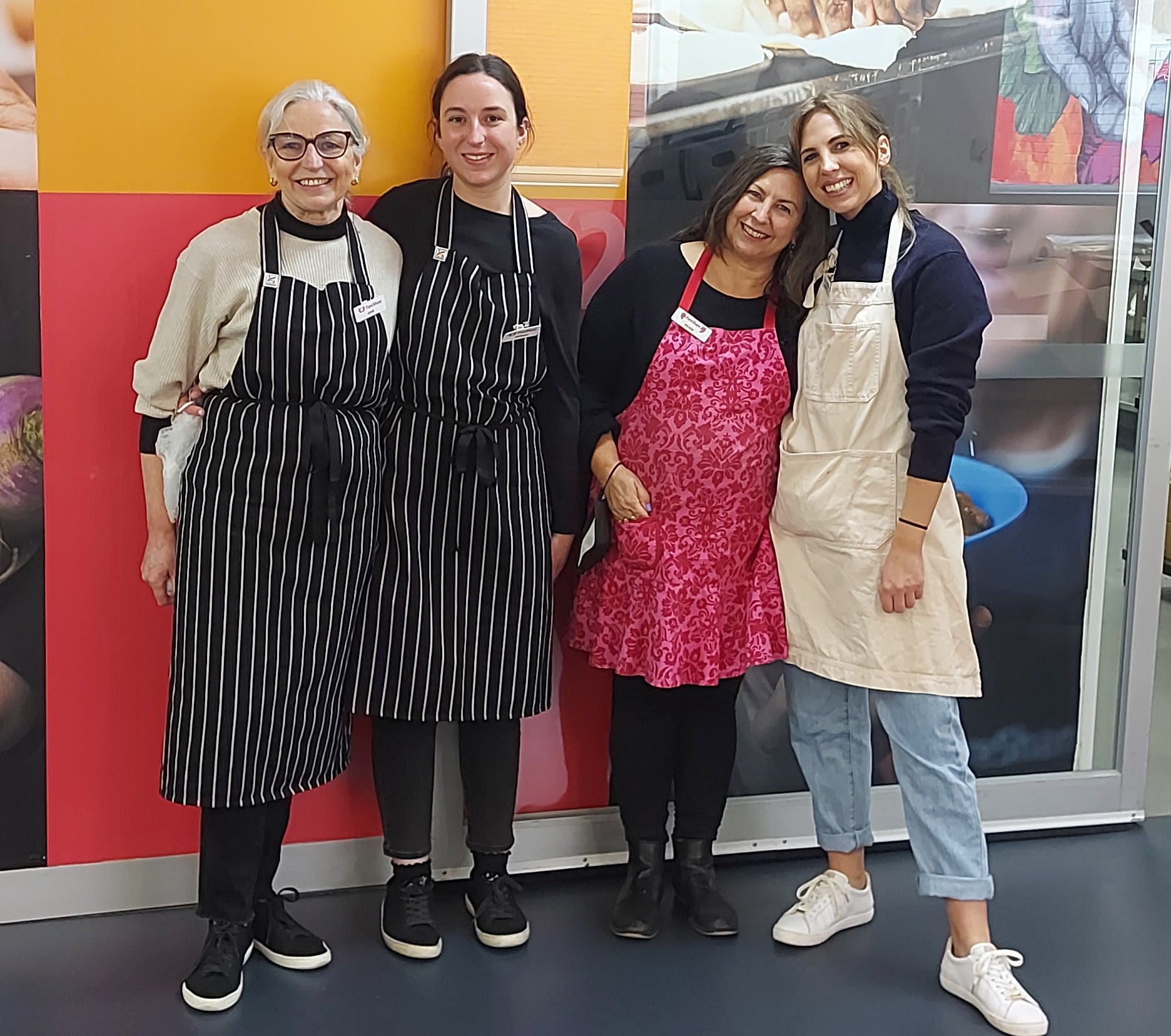
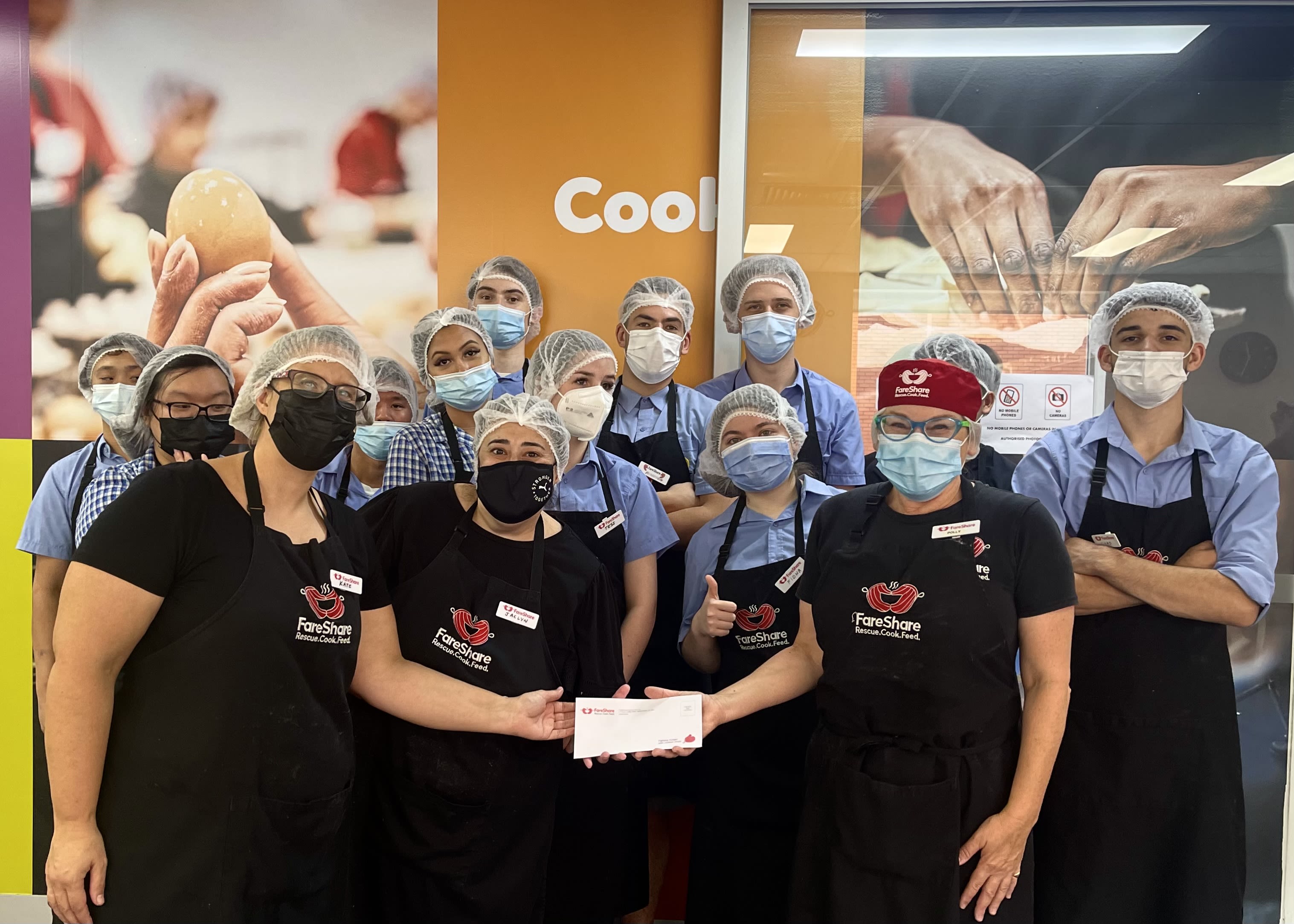
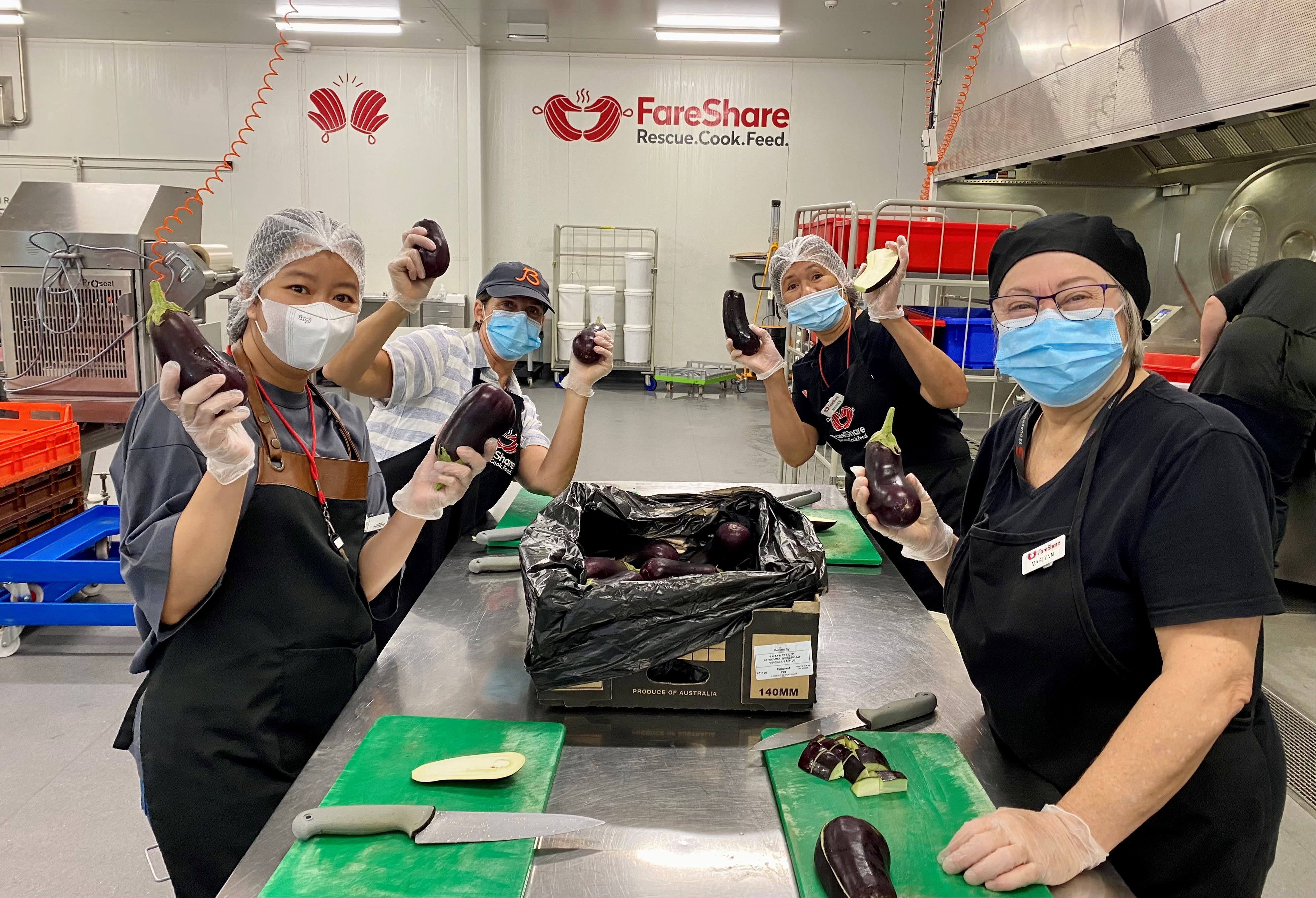
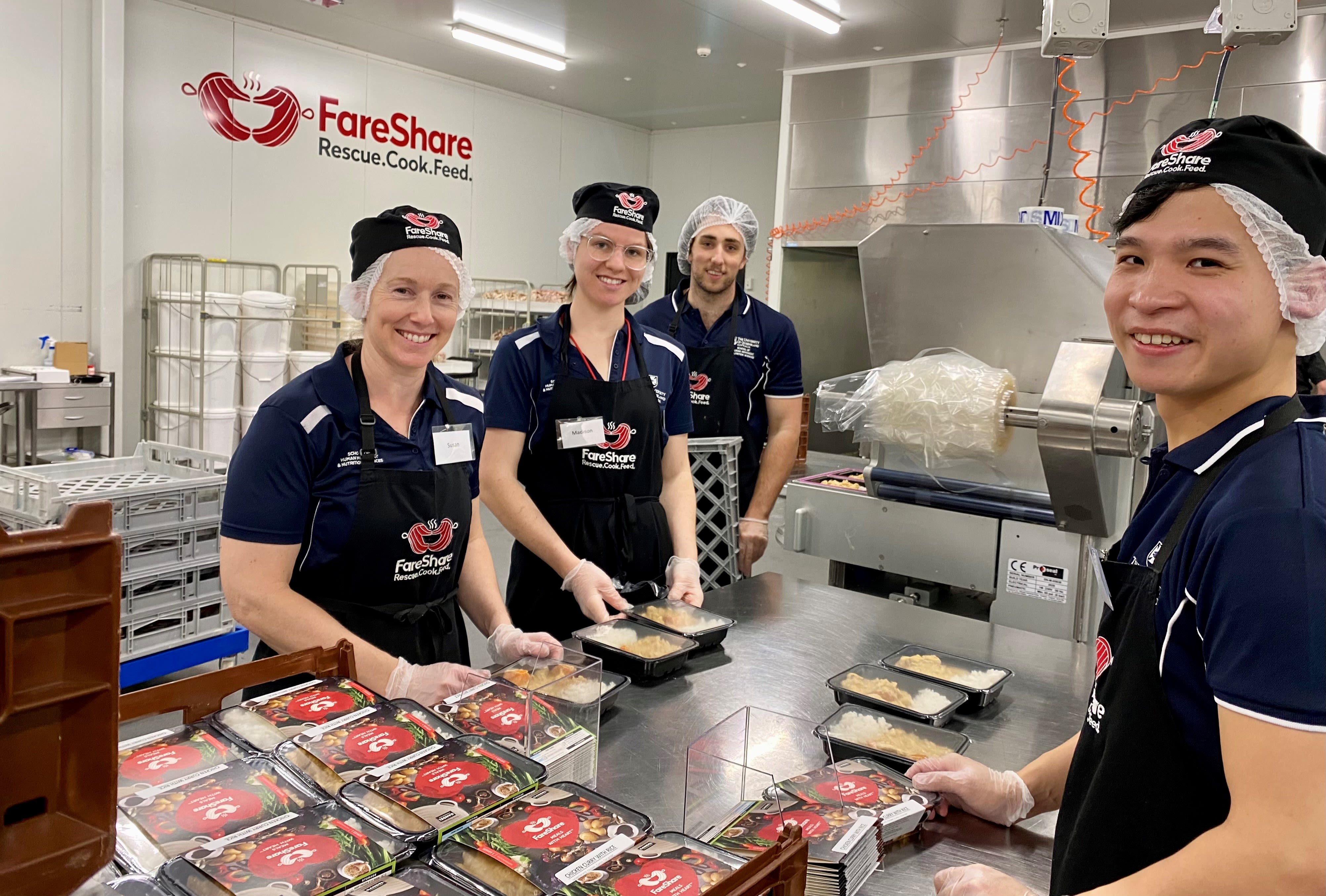
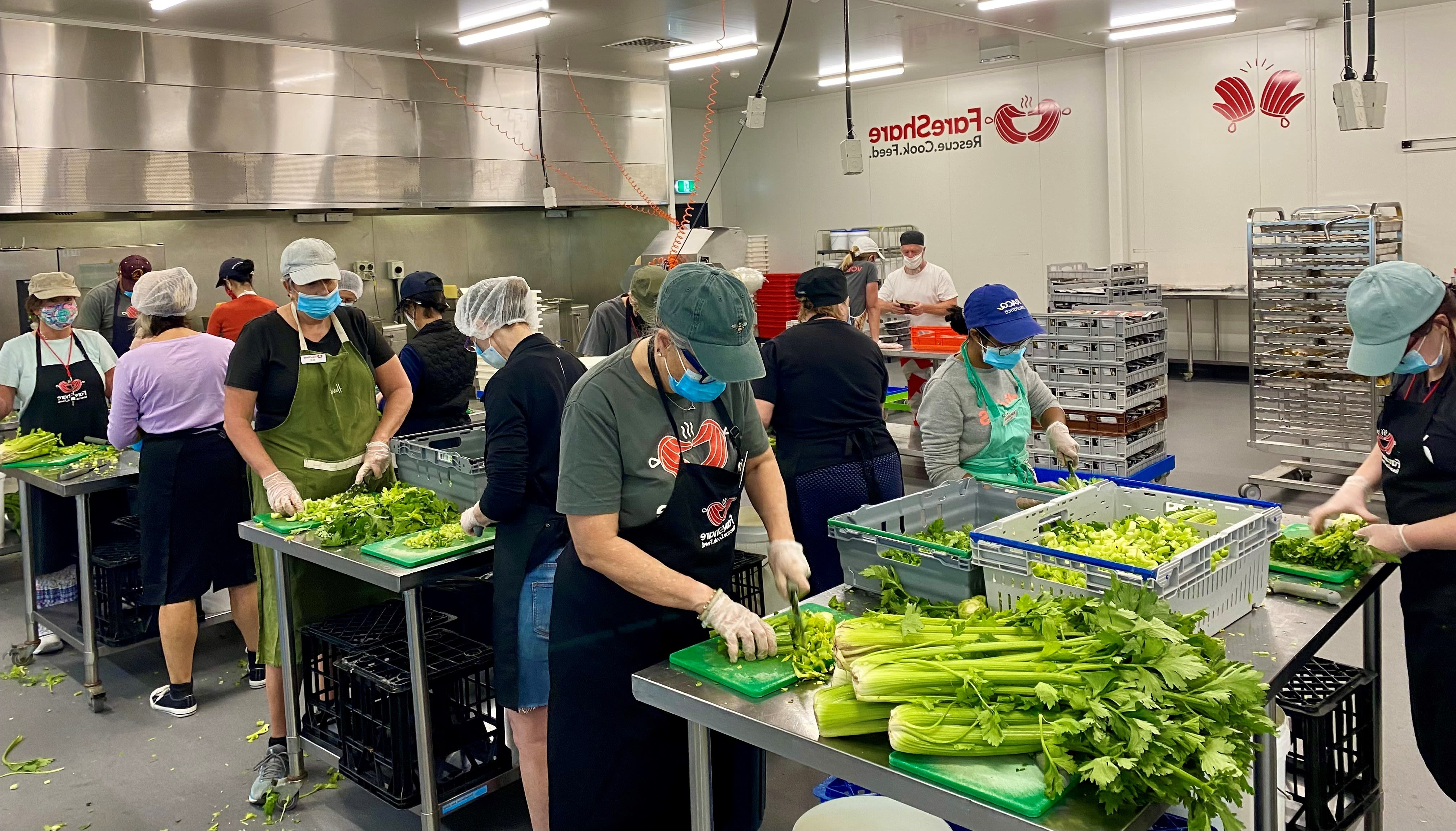
Reconciliation
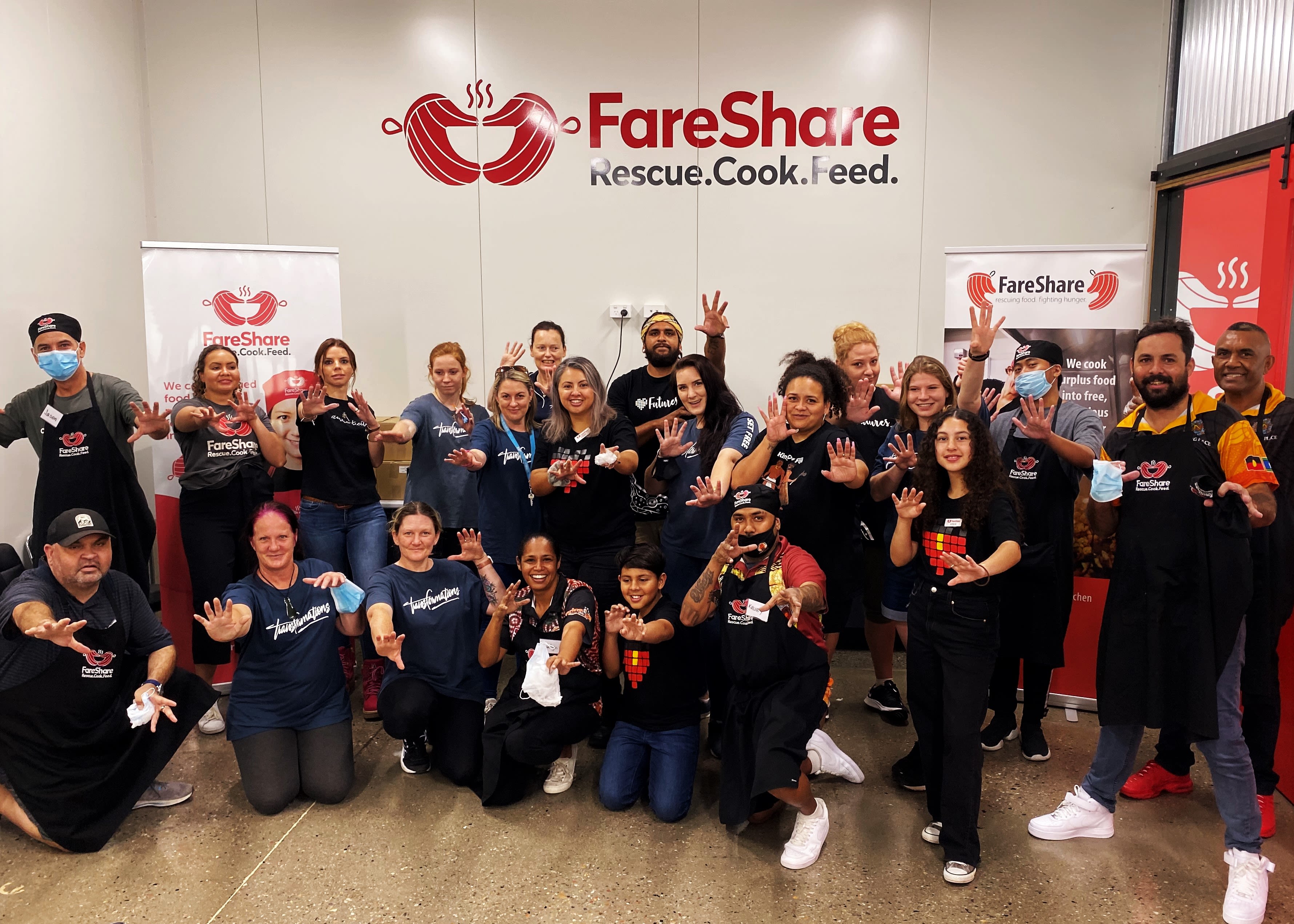
It was a year of milestones for FareShare’s reconciliation efforts.
It began with the recruitment of Jason Mollenhauer, FareShare’s inaugural First Nations Officer.
Jason is a proud Kangoulu man hailing from Wagan & Jagalingou Country. He was raised between Wakka Wakka and Turrbal and Jagera Nations. His Mother, Marina, was a Cherbourg ‘dormitory girl’ and a member of the Stolen Generation.
Jason has extensive experience in community development, building and maintaining professional relationships with a variety of stakeholders and partners including Aboriginal and Torres Strait Islander Elders Groups, organisations, residents, local government leaders, and councils.
Since his appointment, he has used his expertise to drive our First Nations engagement and programs and has achieved some great outcomes for First Nations Australians through the Meals for the Mob program, flood relief efforts, and the creation and implementation of our Reconciliation Action Plan.
Meals for the Mob (MFTM) was developed in consultation with First Nations communities and services to provide targeted food relief in the form of free, nutritious, and tasty ready-to-eat meals.
Empowering, community driven and adaptive, our MFTM pilot program ran in four regional communities in Queensland and Northern NSW for a three-month period from November 2021 to February 2022. It delivered 20,850 tasty, nutritious meals to First Nations communities and services, supporting families and individuals experiencing food insecurity.
The recipes for the six community-selected meals were developed by FareShare Brisbane’s head chef James Fien in collaboration with the University of Queensland’s School of Human Movement and Nutrition Sciences. Overseen by their Chair, Professor Helen Truby, the key objectives were to maximise nutrition and deliver an appealing, familiar taste profile tailored to First Nations Australians.
Overall, feedback was insightful and overwhelmingly positive and pointed to high satisfaction among meal recipients, allowing FareShare to work through some practical suggestions to finesse the program.
These include seeking additional resources, developing a wider variety of meal choices, reaching a greater number of remote communities, creating more appropriate packaging, engaging urban First Nations groups to help cook the meals, and many more.
Towards the end of 2021 and the beginning of 2022, a deluge of floods tore through Southern and Central Queensland and Northern New South Wales. FareShare responded immediately and supplied meals to our First Nations partners to support devastated communities including people living in cars, tents and evacuation centres.
Upon seeing the devastation in places such as Lismore, Ballina and Casino, Jason remarked that: “It’s going to take a long time to come back from this. We are going to stay on the ground and be there for the community. We can lift our support if necessary.”
And that is what FareShare has done, committing to ongoing support to communities still struggling to get back on their feet.
The year culminated in the release of our Reflect Reconciliation Action Plan (RAP). This heralds another FareShare first and signifies our commitment to helping improve food insecurity for First Nations peoples living in urban, regional and remote parts of Australia.
Our Reflect RAP sets out measurable actions and begins FareShare’s journey to reconciliation both internally and externally with the partners and in the communities in which we operate.
Our RAP also captures the resounding commitment, enthusiasm and desire of our board, staff and volunteers to contribute to the initiatives. We are excited to take these steps and to continue building our knowledge of, and respect for, First Nations histories and cultures.
We look forward to progressing our reconciliation efforts through the four phases – Reflect, Innovate, Stretch, Elevate – in the years ahead, and to sharing our achievements with you.
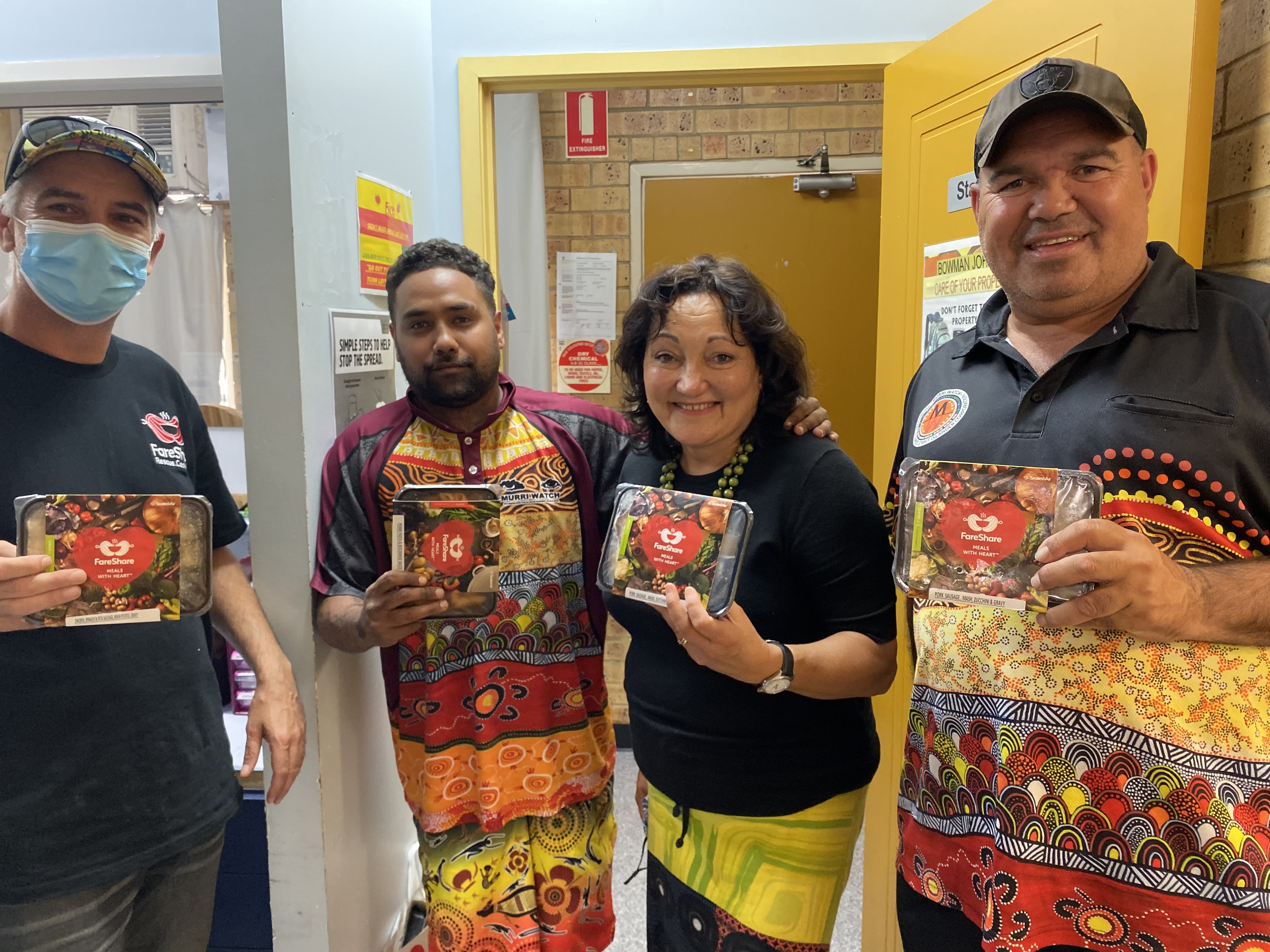
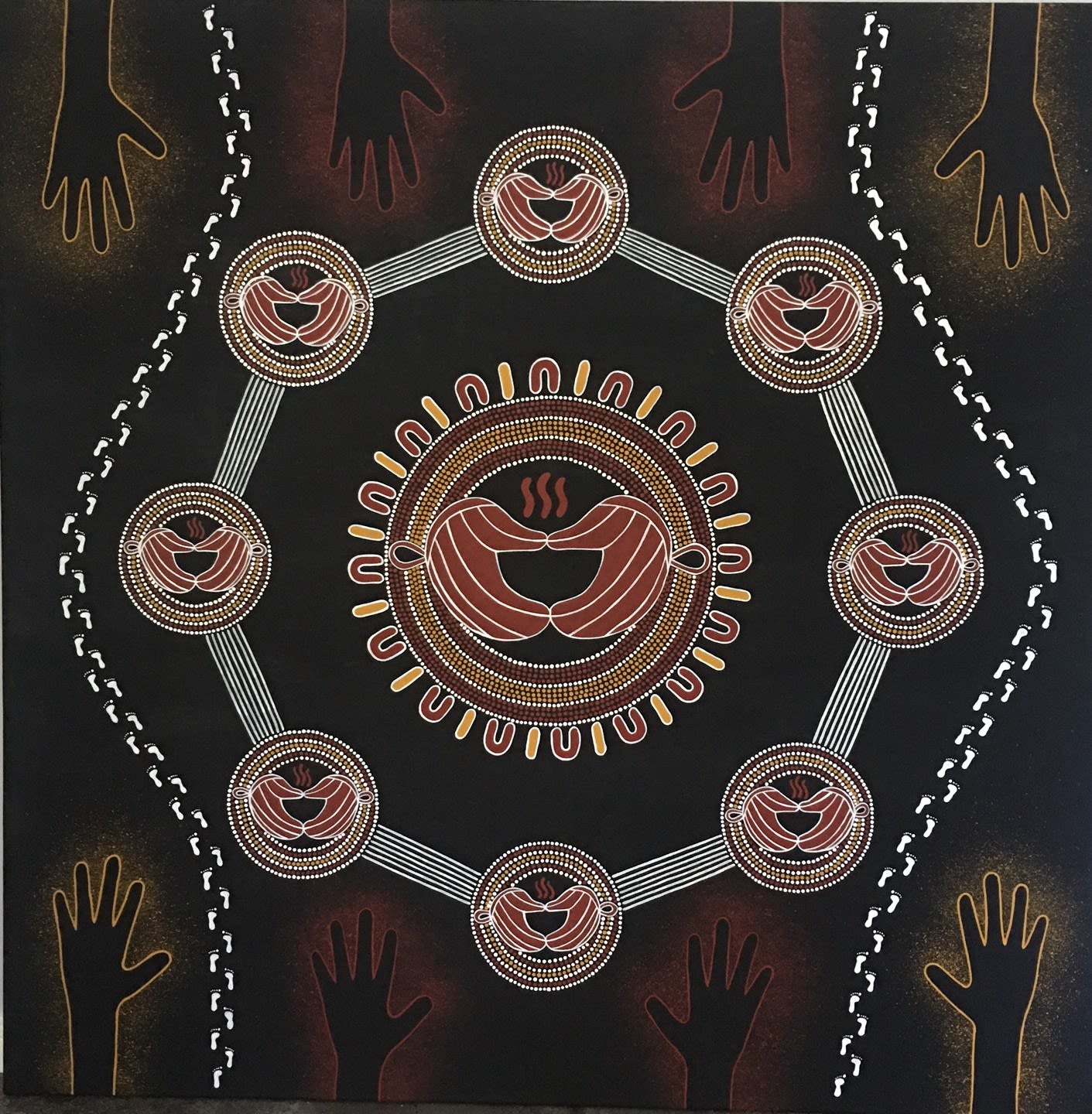
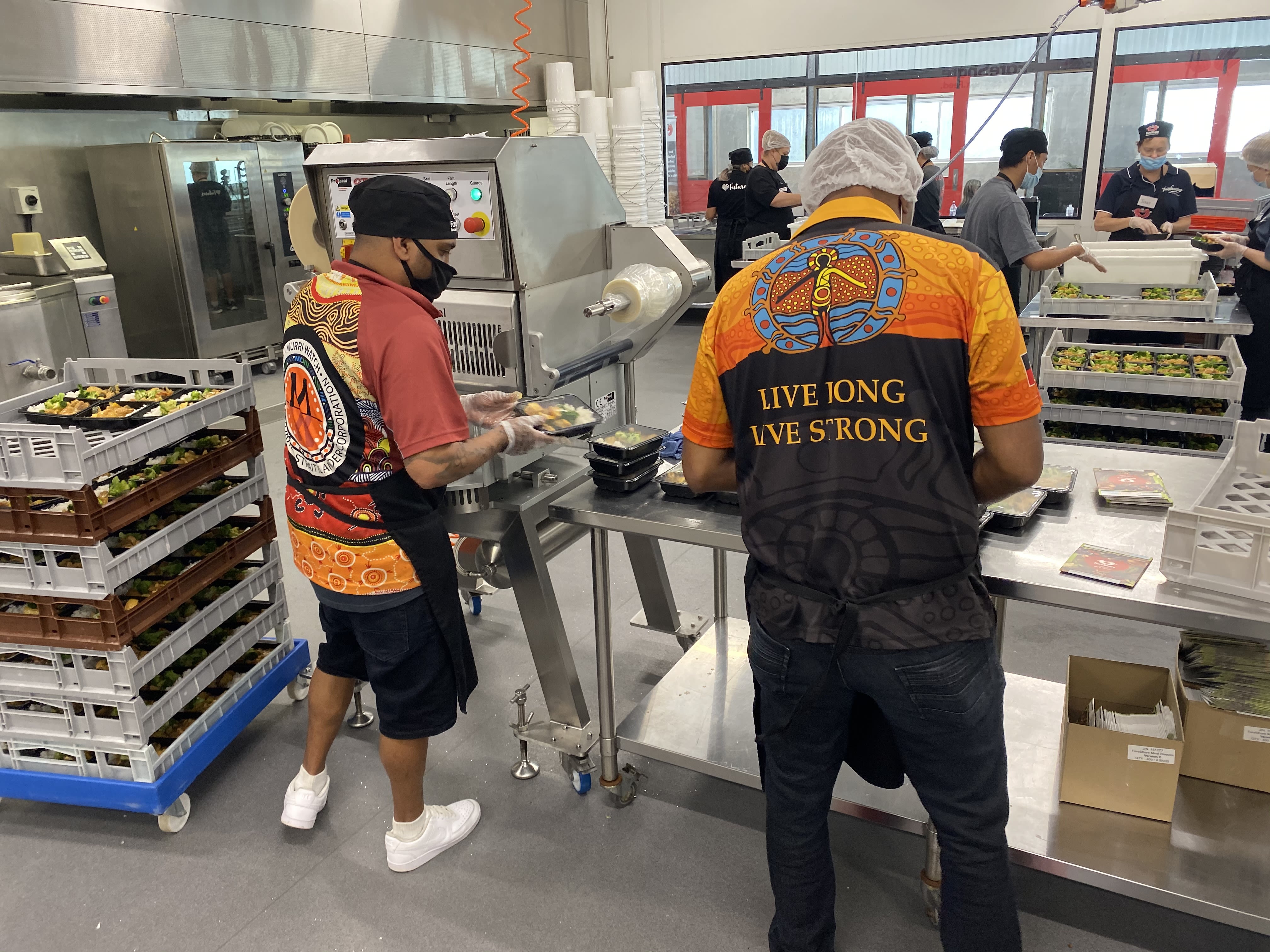

Helping the Planet
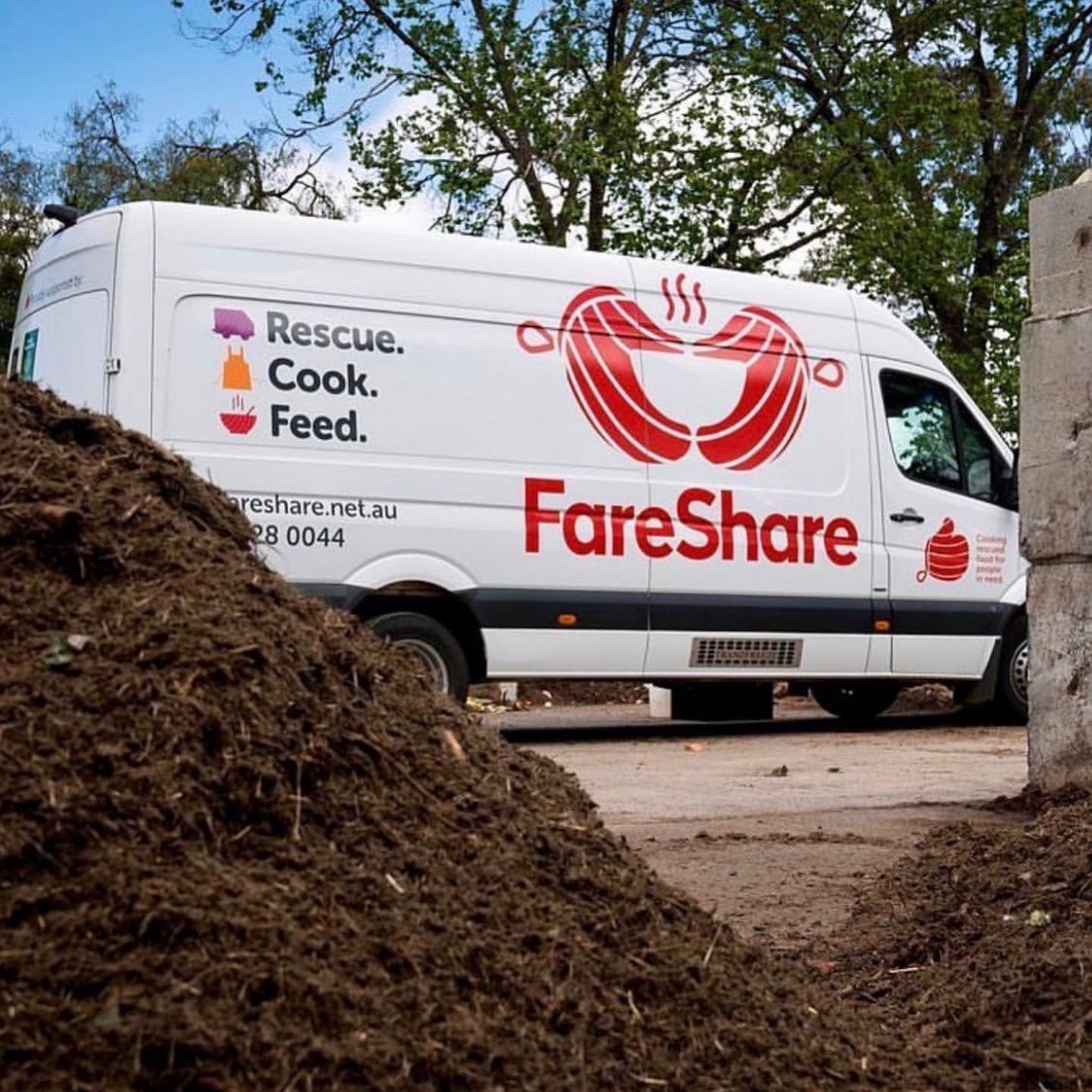
FareShare remains as committed to sustainability as the day we set out on our core mission to rescue food that would otherwise go to waste and cook it into nutritious meals.
Food waste remains one of the biggest challenges to sustainability. An estimated 30% or all food produced for human consumption never makes it to our plates. As a result, it is estimated that if food waste were a country, it would be the third biggest greenhouse gas emitter after the US and China.1
When we waste food, we also waste the resources used to grow our food (water, soils and energy) including the primary nutrients – nitrogen, phosphorus and potassium – that sustain farming, plant growth, and all life on earth. Add to this all the energy used to process, package and transport food and it’s a recipe for disaster.
So, by rescuing 897,612kg of food this year, FareShare helped reduce the environmental impacts of food waste, cut greenhouse pollution and conserve natural resources.
Our kitchens did whatever they could to reduce food waste too. What few food scraps are left, such as vegetable peel and eggshells, are either composted or sent to places that can repurpose them into gardening products, such as a farmer in the Lockyer Valley near Brisbane.
FareShare constantly seeks ways to improve our other processes to reduce our environmental footprint and become even more sustainable too.
Our new Sustainability Working Group is taking the initiative. In May 2022, Tesla batteries were installed in our Melbourne warehouse. These were kindly donated by FareShare’s long term partner ENGIE, and connect us to the Simply Energy Virtual Power Plant.
This allows us to store over 40 kWh per day in energy generated from our solar panels, use it at night, and share any surplus with the local community. The result is great news for FareShare’s environmental sustainability. Thank you ENGIE.
During the year, our Melbourne warehouse switched to a reusable pallet wrap made from polyester and PVC. The material can be used thousands of times, massively reducing our reliance on single-use, stretch-film, plastic pallet wraps. Brisbane is currently trialling this too.
FareShare also increased its use of reusable crates to transport meals and food. This helps reduce single-use cardboard and the need for our charity meal relief partners to sort and recycle. They are also easier to stack and carry, making them more convenient.
One of our major changes last year was the introduction of single-serve meals. These were designed to improve the choice, dignity, and presentation of our meals. They are also ideal for supporting individuals who may previously have received a family serve. There are also environmental dividends to the new portion sizes with less risk of food waste at the consumer end.
The fully recyclable packaging was made possible by a wonderful collaboration of supporters. We acknowledge Sealed Air (the trays), Peacock Bros (labels), and the Brian M Davis Charitable Foundation, Charles and Cornelia Goode Foundation, and Gandel Foundation for the packaging machines.
In early 2022, our Melbourne kitchen partnered with Reground, a social enterprise that helps organisations create a circular economy through waste collection and minimisation projects. They collect and recycle our soft plastic waste to keep it out of landfill and our oceans.
Over the course of only a few months, Reground helped us prevent 585kg of soft plastic from ending up in landfill or our oceans, helped us to stop emitting 468kg worth of greenhouse gas emissions, and recycled 117 trolleys of plastics for us.
We are boosting the solar capacity of our Brisbane kitchen with additional panels to complement our 100kw solar system improving our environmental and financial sustainability. These are due to be installed later this year.
FareShare’s Melbourne kitchen gardens have a strong sustainability focus. Not only did they grow 84 tonnes of vegetables during this past year, but they implemented a range of environmental measures.
Our plot on the Baguley family farm is now recycling much more and has started composting used paper towels (a good carbon source) and the vegetable scraps at the farm. Our Abbotsford kitchen garden has also been composting scraps from the kitchen.
Our kitchen gardens utilise mushroom straw - a waste product from mushroom growing donated by a local oyster mushroom farmer - as mulch. The benefits include an increase in our soil’s organic matter and less water evaporation, thereby reducing irrigation volumes and frequency.
Our Moorabbin kitchen garden is trialling a multi-species autumn/winter cover crop on some beds. This will hopefully increase soil organic matter and water holding capacity while decreasing irrigation frequency. It should also add nutrients to the spring crops that follow, stimulate beneficial fungi and microbes in the soil, and suppress weeds.
All three of our gardens are optimising crop rotation to reduce pests and the impacts of soil-borne pathogens, such as white blister. Our garden crew also plant flowers to host beneficial insects to tackle pest insects.
There is always plenty more to be done, which is why our Sustainability Working Group will continue to drive improvements.
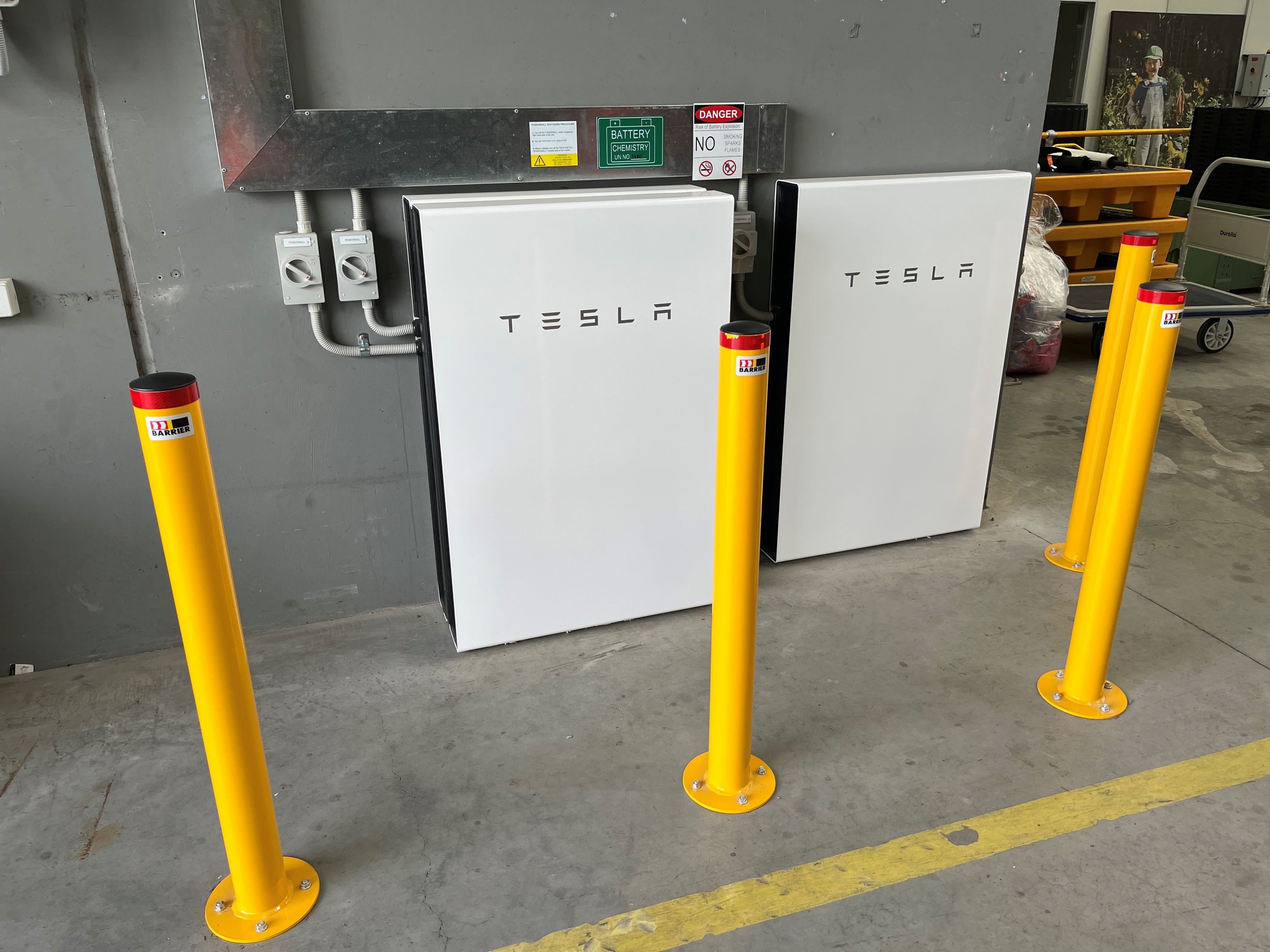
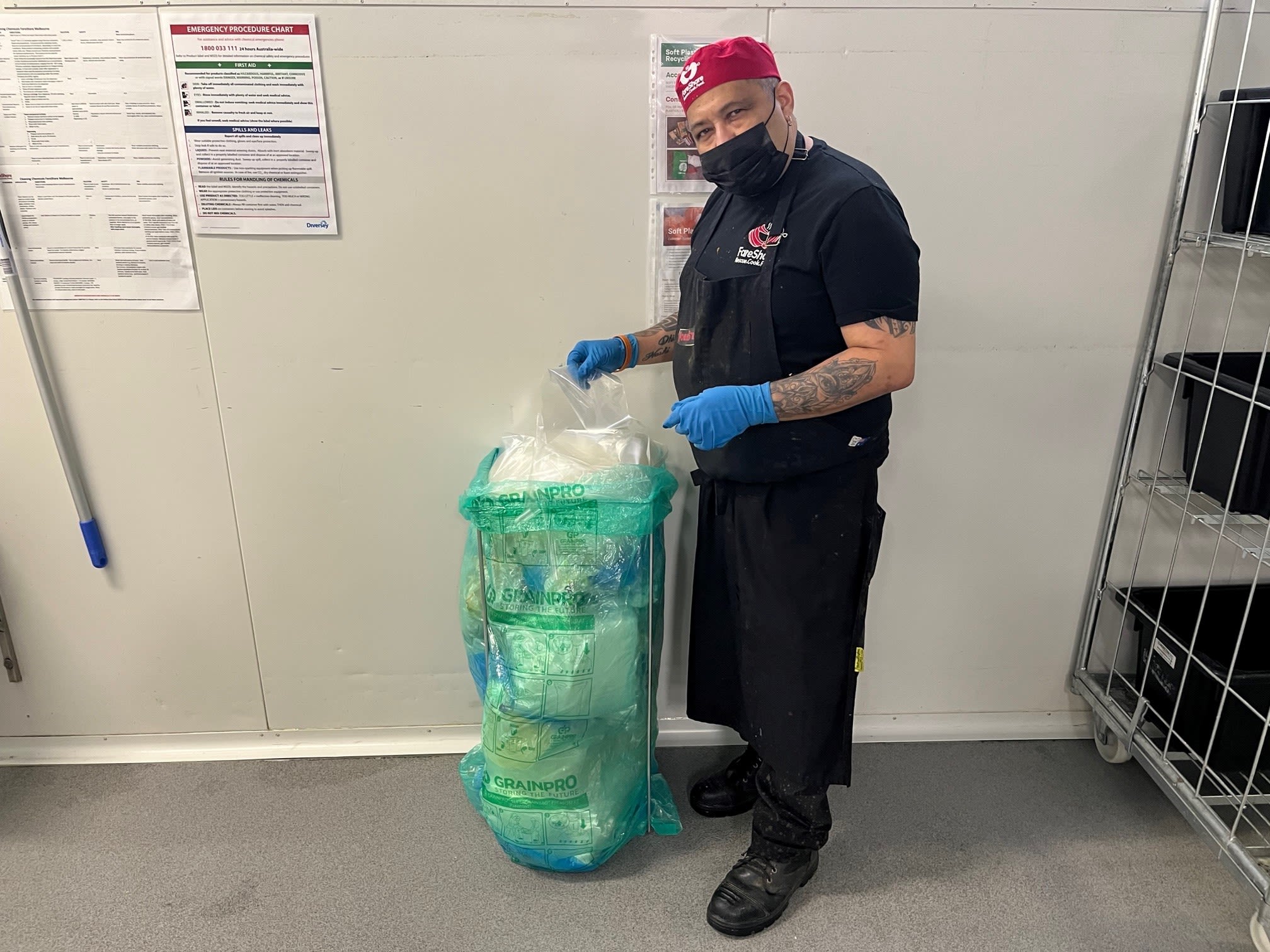
Financials
Download as PDF
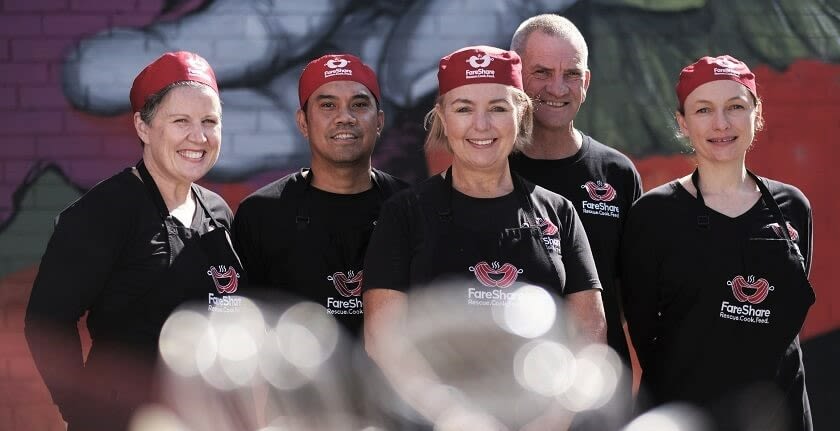
FareShare would like to extend an enormous thank you to our wonderful donors and supporters over this past year. We couldn't do what we do without you.
- Amy Adeney
- Antipodean Family Foundation
- Arcare Family Foundation
- Besen Family Foundation
- Birchall Family Foundation Trust
- Brian and Sandy Dudakov OAM
- Bruce McMullin Foundation
- Cargill Australia
- Casula Central
- Charles and Cornelia Goode Foundation
- City of Yarra
- Clayton Utz Foundation
- Dalgetty Machinery
- Dodge Family Foundation
- Duncan Andrews
- E&P Financial Group
- Ed Hutton
- ENGIE
- Fair World Foundation
- Freemasons Foundation Victoria
- Gandel Foundation
- Goodman Foundation
- Gringlas Family Charitable Foundation
- Helen Fraser Gift Fund
- Honda Foundation
- Hope Saba Foundation
- Jack and Ethel Goldin Foundation
- James McIntyre
- Jim and Andrea McKay
- John and Betty Laidlaw Legacy
- Kamener Foundation
- Lascorp
- Liberty Specialty Markets
- Lilly and David Harris OAM
- Lord Mayor's Charitable Trust
- Magistrates' Court of Victoria
- Mark Laidlaw
- Mary-Lou and Alan Archibald QC
- Mather Foundation
- Matthew and Tracy Dudakov
- McClintock Family Fund
- Molloy Family Foundation
- Mount Gravatt Mazda
- Natural Selection Group
- Opalgate Foundation
- Orloff Family Foundation
- Peter Lemon
- Peter Smart
- Portland House Foundation
- Prior Family Foundation
- Queensland Department of Environment and Science
- Richard Sellars-Jones
- Rilka Warbanoff
- Rowe Family Foundation
- Sealed Air
- Shine On Foundation
- Taking Shape
- Tank Foundation
- Teska & Carson Pty Ltd
- The Bird Family Charitable Trust
- The Eisen Family Private Fund
- The Humanity Foundation
- The Ian Potter Foundation
- The Langdon Family Foundation
- The Marian and E H Flack Trust
- The Metamorphic Foundation
- The Silberscher Family Foundation
- Tony Osmond and Fiona Griffiths
- Tracey and Frank Cooper
- Transurban
- Victorian Department of Families, Fairness and Housing
- Victorian Department of Jobs, Precincts and Regions
- Woolworths
- Y. Mee
FareShare also thanks and acknowledges the following pro bono supporters for the generous donation of professional services and other invaluable assistance.
- Adrian Lobo
- Americold
- Arnold Bloch Leibler
- Boomaroo Nurseries
- City of Yarra
- Citywide
- Clayton Utz
- Dani Valent
- David Aitken
- Elizabeth Andrews Catering
- Endeavour Group
- Enthral
- Jaymak
- Les Baguley and Baguley Family
- Lineage
- Linfox
- LMOB Electrical Contractors
- Majestic Young Plants
- Marian and EH Flack Trust
- Metcash
- Moorabbin Airport Corporation
- Multipest
- Nando's
- Network Overdrive
- Nic Dowse (Honey Fingers)
- Pitcher Partners
- Plant Doctor
- Plantfulness
- Queensland Treasury Corporation
- Salesforce
- Sealed Air
- Sporadical City Mushrooms
- University of Queensland, School of Human Movement and Nutrition Sciences
- Viscount Pooling Systems
- Woolworths Maintenance
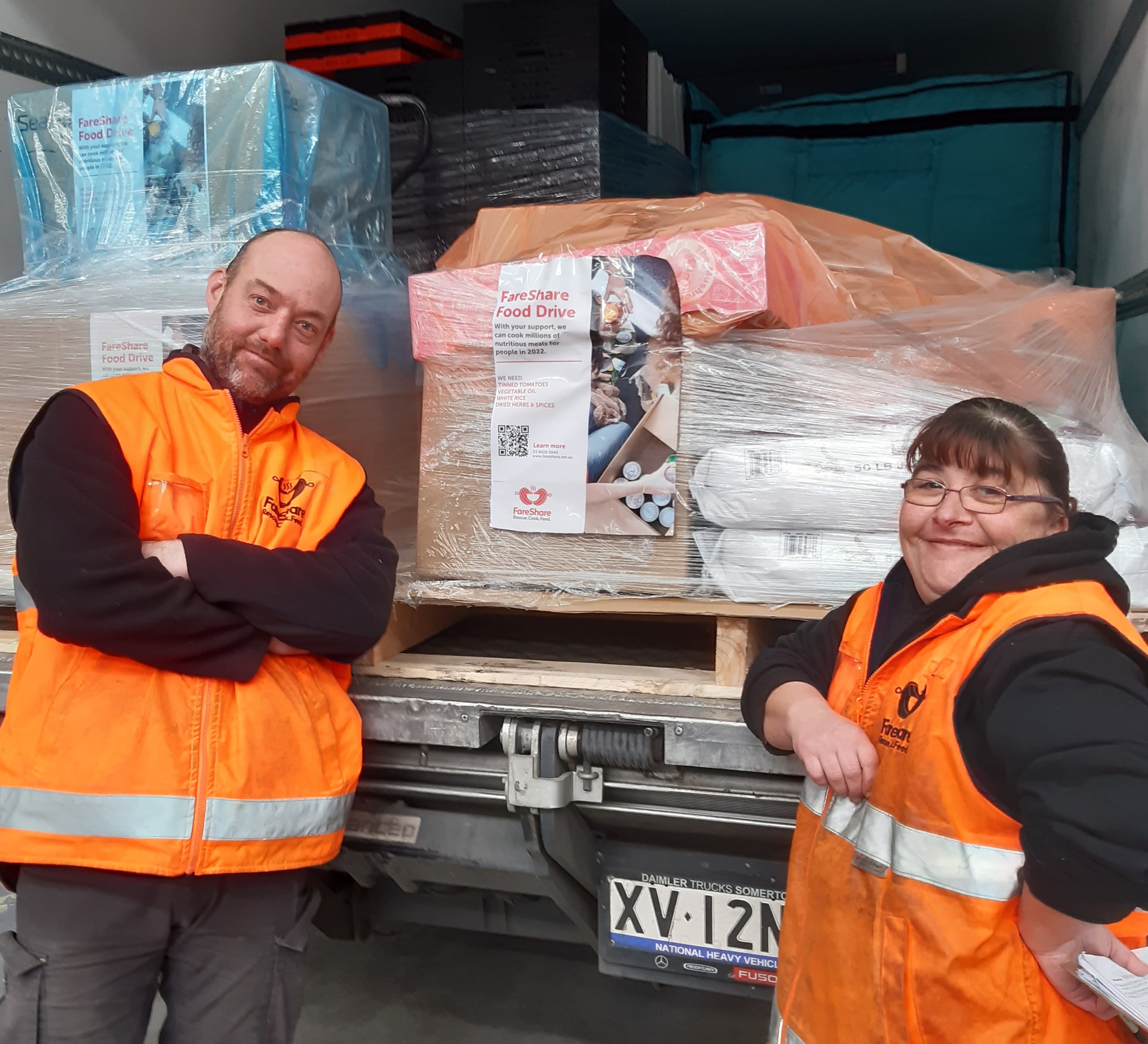
FareShare staff Tom and Tania receive a massive food donation from Sealed Air
FareShare staff Tom and Tania receive a massive food donation from Sealed Air
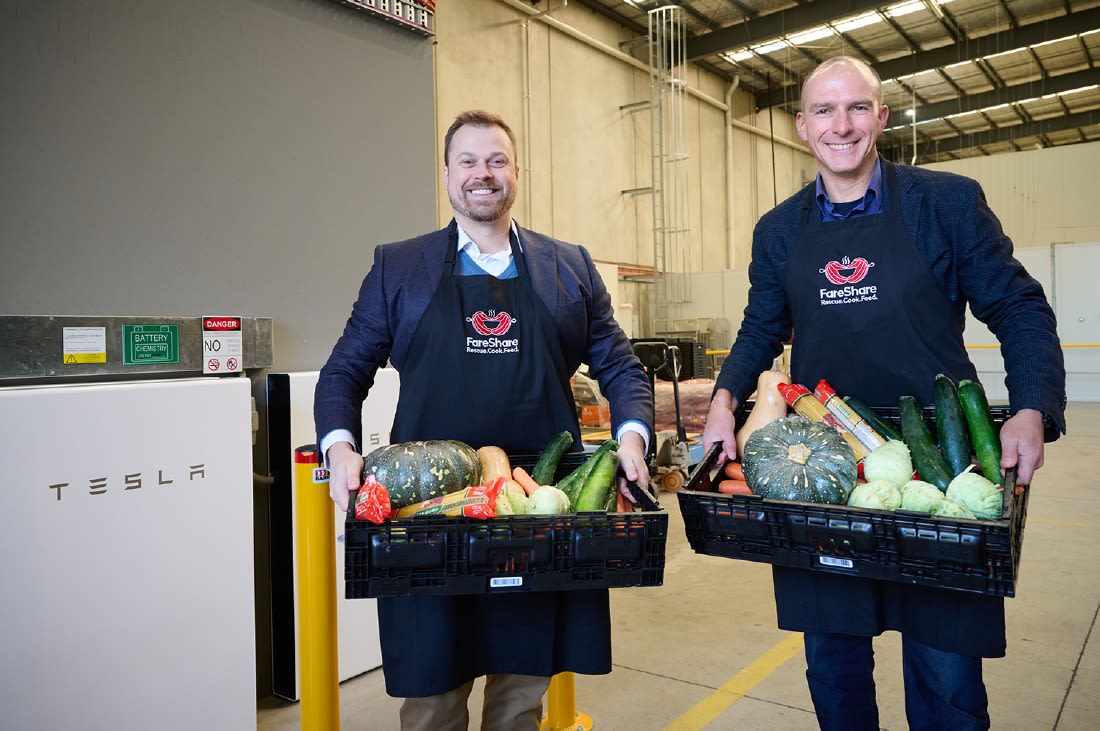
Tesla batteries to store solar power and help run our Derrimut warehouse, kindly donated by our friends at ENGIE
Tesla batteries to store solar power and help run our Derrimut warehouse, kindly donated by our friends at ENGIE
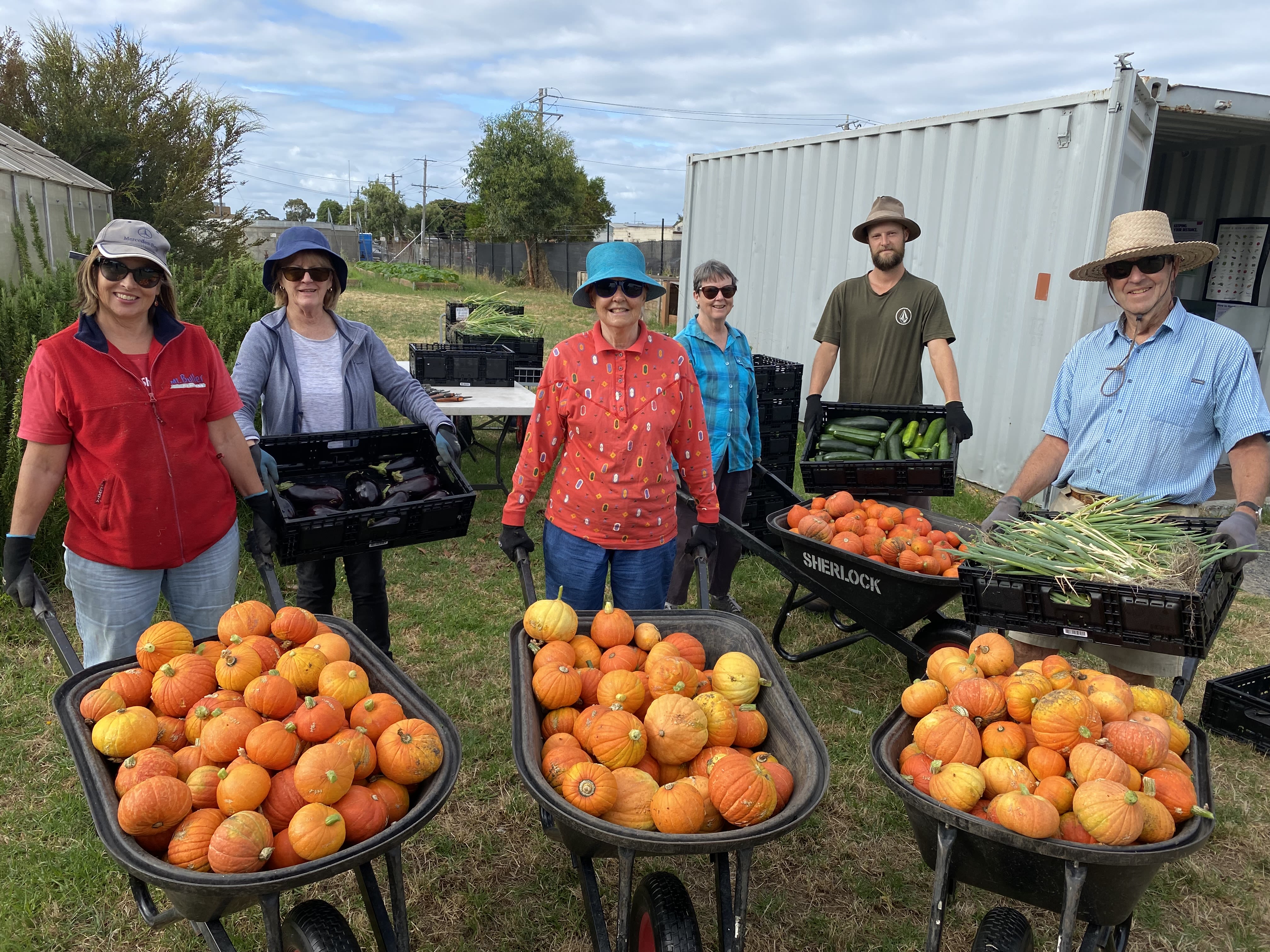
Moorabbin Garden volunteers harvest vegetables on land provided by the generous Moorabbin Airport Corporation (MAC) and the Goodman Foundation.
Moorabbin Garden volunteers harvest vegetables on land provided by the generous Moorabbin Airport Corporation (MAC) and the Goodman Foundation.
fareshare.net.au
1-7 South Audley Street, Abbotsford VIC 3067
info@fareshare.net.au | Tel: 03 9428 0044
46 Steel Place, Morningside QLD 4170
brisbane@fareshare.net.au | Tel: 07 3899 3248
Facebook | Instagram | LinkedIn | Twitter
Download as PDF
